#heavily favors plot over character interaction & study
Text

losing it
#none of this even goes together 😭 you know what that’s iconic of him actually v true gennaro he’s so so cool#personal#i am FINALLY abt to finish this god#i can’t say it’s a favorite#heavily favors plot over character interaction & study#i can see why like it’s not a bad writing decision per se but it’s not quite my cup of tea#i prefer strong character focus#everyone in this is v flat#they all seem more like plot devices than actual characters#also it tries to be suspenseful but doesn’t entirely pull it off a lot of the time imo#like it’s Really obvious exactly what’s going to happen at least until the end at which point it becomes more unpredictable#but this impression may be in part bc my brother compared it to illminae levels of suspense and. it is definitely not there#so i had expectations that may be marring my judgement#i do also think i would have enjoyed it more if i didn’t know sm abt it already? like there ARE several parts where the suspense is pulled#off well but even those didn’t do much for me bc i’m already familiar w them from my brother’s rambling#which is not the fault of the book at all#it’s just my own issue#and it was p slow for a good while in the middle which is why it took me so long to get through#but i really liked both the beginning and the end#it speeds up a lot in the last hundred pages or so#and the beginning was super intriguing all around i loved it#SO. yeah it has its merits and i can def see why other people like it (i did love the theoretical musings and hard science aspects of it!)#and i did really like studying the themes prevalent throughout#but overall not a favorite#still going to read the lost world at some point tho bc my ap lit teacher said it’s much better (though he does also love the first) and my#brother agrees that it’s better written despite his sentimental feelings toward the first#but i’m definitely going to read smth else in between probably mi & les mis
4 notes
·
View notes
Text
okay so I don't normally fuck with playing d&d from a module or actually reading the WotC books but. BUT. I want to be able to DM eventually in my second d&d group where we alternate DMs and I think the most realistic way to DM three groups would be base one of them off some preexisting material, albeit probably heavily tweaked. so I'm checking out the new Strixhaven book, because wizard university is a super fun premise!
I just finished reading the chapter outlining the plot of sophomore year and I have Thots:
the five colleges are interesting and I like that a member of any class could very feasibly belong to any of them. I wish the color schemes of each college were a little more clearly outlined but oh well, it's not hard to piece together from the illustrations
there sure are a bunch of professor and student NPCs provided, which is very helpful for populating a large school and even more so if you like making weirdo NPCs and know you'll be inventing loads more.
having said that I'm a little confused about why so many NPCs who are supposed to be first years like the players are apparently already fully integrated into the school clubs and extracurriculars, to the point that they're hanging out advertising the clubs at wizard orientation? make it make sense!
also: it feels like despite emphasizing that you could meet anyone of literally any race at Strixhaven, NPC professors and students seem to be heavily weighted in favor of humans and owlin. I'd definitely be making some changes there.
the mechanics for studying and prepping for tests are interesting! I'm not 100% sure I really Get them, but I'd be happy to learn by playing them out with my party
mechanics for relationships are also shrimpteresting. I wouldn't incorporate the inspiration bonus from having a Beloved (aww) into a regular campaign for sure, but it seems neat to play out in a more short-form module-based campaign. having said that, I could stand to see a little more sauce on the negative flipside where you can have rivals? rivalries mostly come with minor inconveniences related to your rival's extracurriculars or campus job, and I really feel like we could get more spice in that.
the maps are very thorough and really neat! the designs for each specialized college's campus are so cool to look at, especially Prismari.
the adventures for the first year are pretty fun, and I can definitely see them working as events that happen with a few years between each one to let the full year pass by. that doubly works if you're sprinkling in personal interactions, extracurricular developments, and delving into studying as well as a few other classes that the characters are taking.
the biggest nitpick I have is that based on the amount of damage players can take doing the doll retrieval fetch quest, I really think they should be able to level up to third level before doing that.
but the extracurriculars are cool and I think could make for some great roleplaying, and ditto with the campus jobs. the jobs also represent a really good opportunity to integrate financial issues into the stories of PCs who are interested, as well as adding some interesting complexity to some NPCs as well.
sophomore year doesn't feel nearly as strong, especially since so much of the plot resolves around hoping that the party will want to take part in the magic sport du jour. if they don't want to it could get real awkward real fast, since you either have to bend over backwards to make them do it or just... improvise real fast on the fly. I'm fine with the latter, obviously, but I can see that being potentially sticky for a lot of DMs. if I run this, I'll probably do a LOT of reworking on the "Hunt for Mage Chapter" tower.
I'm heading into junior year/"The Magister's Masquerade" now, will report back
91 notes
·
View notes
Text
One for All and All for One: The study in complimentary and infinite (wasted) potentials
One for All and All for One: two Quirks whose history we can, in the universe of Boku no Hero Academia, treat almost as the history of society. Their users had left enormous impact on everyone in the series, and through hints we can see their influence stretching long, long back to the first appearance of the Quirks.
Neither Quirk can be considered ‘normal’, though: the ability to take away Quirks at whim and an ability to share Quirks with others (which would inevitably leave you Quirkless) are both complete anathemas to the society that by and large is half-in love with the idea of simply having a Quirk (which deserves a whole breakdown in on itself, but that’s not what I’ll be writing about here!). And yet, One For All users are all heroes, and All for One users are all villains as far as we know (written after the release of manga chapter 280).
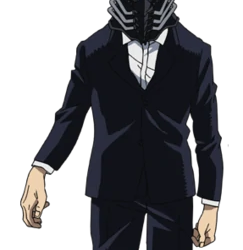
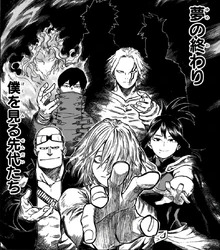
How is that even possible? With how objectively similar they are, why aren’t they both heroes, or both villains?
Well, before we take a crack at how Horikoshi coded the Hero society that made this happen, let’s first take a look at just why I’m so surprised the two Quirks aren’t on the same ‘side’. Also, obligatory ‘spoilers ahead’ warning for everyone who’re anime-only watchers, or haven’t gotten past Meta Liberation Army arc in manga.

Purely from the activation/mechanics point of view, All for One and One for All are warped mirror images of each other. All for One functions on the assumption that a) the user knows the other person has a Quirk and b) the Quirk doesn’t have an inherent clause that disallows itself to be taken by force when it comes to taking it. One for All is the only Quirk so far that has shown the resistance to the b), as it is encoded in the very nature of the ‘share-along’ Quirk that forms the true base of One for All that it can only be given away willingly.
Why is this so important? Because All for One doesn’t only take Quirks, it’s also capable of releasing them and giving them to others, whether the recipient is willing or unwilling. In this regard, One for All is startlingly identical: it can be forced upon someone else, as long as the DNA is exchanged and the previous user is willing to give it away. This little fact is often overlooked (likely deliberately) by the existing canon in favor of emphasizing the ‘cannot be taken forcefully away’ which makes sense plot-wise, but not ethics and logic-wise.
But who knows, maybe Horikoshi is holding back on us, and One for All ends up being the ultimate villain of the story.
… yeah, not likely. But the idea is interesting, isn’t it?
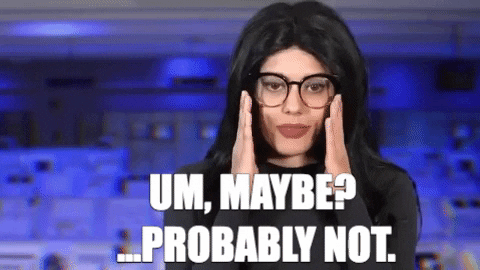
Moving onto the way they interact with their users and other Quirks, One for All and All for One are again very, very different, but with a shared approximate visualization of usage behind it. The closest approximation of how they interact with other Quirks would be, in my opinion, be gravity – but two very different applications of gravity.
There are two relevant things you need to know about gravity: it is defined by the masses of an object interacting with another object, and every single object in the universe has its own gravity field. (thank you, Physics nationals I went to once, for forcing me to learn more about gravity!)
All for One is more akin to a star within a stable planetary system: it holds planets, satellites and comets (other Quirks) locked in its orbit, but any change can make all those objects lose their orbits and go wander in the deep space. Its hold is strong, but the fact still remains it can be nullified in order to give away Quirks. It’s also stable – its attraction/hold power doesn’t change with the number of Quirks taken, it simply gives it a bigger array of powers to work with.

One for All on the other hand would be closer to black hole: its gravity is so enormous even light, the fastest object in the universe, cannot escape it, and its mass (and therefore its gravity) grows stronger with every object it swallows. Once it grabs a hold of anything (its user’s other Quirk) it merges it with itself and keeps it for forever, with very little chance of it ever surfacing again as individual Quirk (unless your name is Midoriya Izuku). However, it heavily relies on the energy (other Quirks it merges with) to provide power-ups; hence the ridiculous difference between Izuku’s and Toshinori’s One for All. (also protagonst shenanigans, but we’re not going that far into metatextuality here – that needs its own essay)

So, concept-wise, One for All and All for One are again identical in the idea behind it, but drastically different in application – both still fucking scary, but what can we do here, our main protagonist and antagonist need to have OP armor around themselves.
This leads us to the probably the biggest spoiler I’ll discuss in this essay:
this panel.
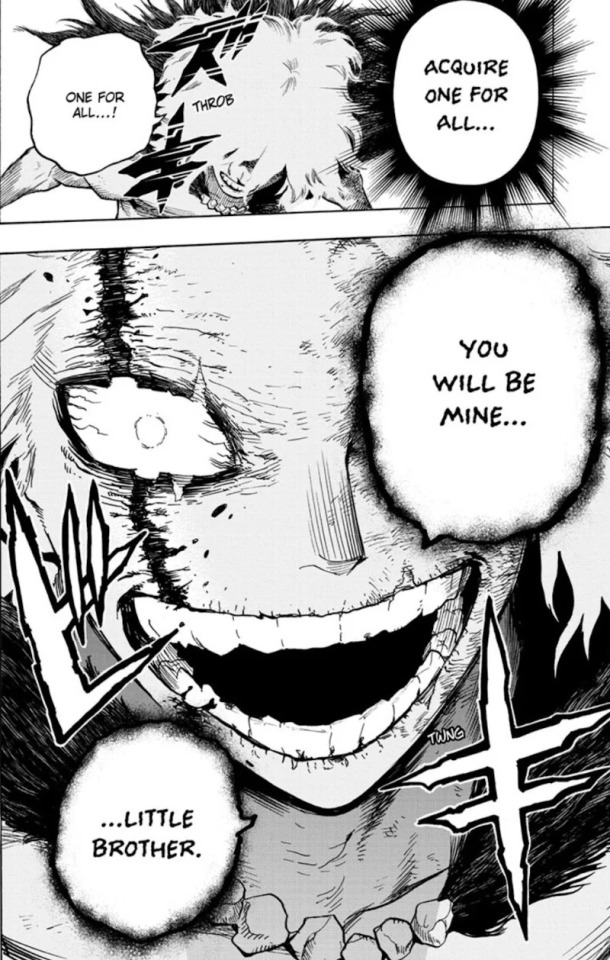
In chapter 270 of manga, Shigaraki Tomura is revealed to have been passed All for One, which is a whole mindfuck in on itself that Horikoshi needs to explain stat because I’m going crazy over here with theories (!!!), but moving on. The short and extremely brief summary of what happens afterwards is: Heroes discover where Tomura is while he’s still being transferred All for One, they wreck the Nomus and facility, Shigaraki gets partial All for One and his original Quirk Decay goes absolutely nuts again, Izuku runs off to face him, and at one point point, while using Ragdoll’s Search, Shigakari utters a very strange sentence while seemingly under the influence of All for One (the Quirk):
“You will be mine… little brother.”
Moments later, Shigaraki snaps out of it and comments about Sensei (All for One) no longer being his puppeteer, that he’s making his own choices and not Sensei’s.
Here we get a stunning punch in the plexus about what we already have been hinted at during Izuku’s fight with Shinsou Hitoshi, during Kamino Ward and Joint Training Arcs:
One for All and All for One both retain the echoes of their past owners.
Now, here comes a million dollar question: is this something both the baseline ‘share’ part of One for All and All for One possess (which would further link the two Quirks, and also explain a lot of characterizations in the series so far), or is it an imprint of All for One on ‘stockpile’ part of One for All that ‘share’ part absorbed and made its own? Both possibilities are extremely intriguing and make any future possibility of unification (which was apparently Sensei’s original goal before, judging by that one panel) extremely volatile, and very intriguing if Horikoshi pursues that idea to its end.
Speaking of the man himself, now we arrive at the question that really started the whole essay here: how come it was All for One chosen to be the ultimate evil, and One for All to be ultimate good? As we’ve seen so far, both Quirks are startlingly similar; theoretically, could All for One be a ‘heroic’ Quirk and One for One for All ‘villainous’?
The answer is yes and no.
Yes, because theoretically, switching the two would still make the story work; it’d change the motivations of characters drastically, sure, and turn the story of generations of good trying defeat one evil into one good fending off generations of evil, but it’d work – and no, because that’d fundamentally change the society in which Boku no Hero Academia’s current time frame is, and society is the key underlying factor in this entire story.
Let me explain through the examples of three characters and a faction.
Midoriya Izuku is Quirkless person in a society who is, like I said at the beginning, half-in love with the idea of having Quirks – the fact that you have them makes you seem useful, someone with potential, no matter how objectively useless some Quirks inevitably can be in certain lines of work. By their standards, he’s without potential, and therefore is largely useless out of gate. Had All for One been in public eye and celebrated as Hero, he’d be the pinnacle of useful: there’d be no danger of bad reactions to donated Quirks in his DNA, and he, someone who wishes desperately for a Quirk, could easily be given a Quirk of someone who finds their life unbearable due to it.
Bakugou Katsuki, someone with extremely property-damaging Quirk, would constantly be told that if he doesn’t behave himself, he’d be sent off to All for One to have his Quirk taken away – in essence, he’d be no one special, just another kid with a Quirk. Since All for One is so visible, it’d be all too easy for parents and teachers to threaten their kids into compliance whenever they throw an over-powered tantrum with the removal of a Quirk; it’d also be a good deterrent for any Pro Heroes that existed there to not get too comfy with their jobs, because they could easily be taken out of it if they manage to anger All for One enough, which would deter some people from being Pro Heroes.
Shigaraki Tomura (Shimura Tenko), someone whose Quirk came in during an extremely traumatic event and left him so scarred mentally he was never quite the same again, could easily simply give away his Quirk and have something far less volatile and triggering if he wished so, and also have a chance of potentially one day seeing his Quirk in the hands of someone like Izuku or Melissa, who could use it to its full potential without being constantly triggered by it or being re-traumatized again and again by the society who would rail on him for having such a potentially devastating Quirk.
Meta Liberation Army (which is a poorly disguised Brotherhood of Mutants on Genosha in X-men cartoons, let’s be realistic – the whole thing about the superiority of fight-compatible Quirks was not subtle at all) would be a much smaller and a lot less influential group. The publicity of a Quirk being able to take away other Quirks would make the existence of Deika City clones very, very difficult; it’d take but one hint, one whisper of a fringe group amassing in remote location that wants to eliminate so-called ‘useless Quirks’ for All for One to act – as much of an asshole as he is, he was shown [cite] to like all kinds of Quirks, despite only keeping the ones he felt were the most useful to him.
OK, but what about them being on the same side? You might ask yourself. If they’re so similar, why not make them both on the same side?
One, drama is always more delicious if there are high personal stakes involved, and nothing gets more personal than family drama – that’s just a fact. (Kardashians, anyone?)
Two, this is shonen – openly bad guys being the protagonists isn’t often done (in mainstream at least).
Three: we need some material to make all those ‘Izuku’s related to All for One or One for All first user’ for our satisfaction before Horikoshi josses the whole thing, okay??
(no, this is certainly not a call for you to make more ‘Izuku is related to original two brothers’… but it’s heavily suggested lol)
Thank you for sticking around until the end of this essay! Have a cookie, and enjoy the hell my mind led me to during the binge-read of the last 5 released chapters of manga:

#bnha meta#mha meta#quirk analysis#quirk meta#ofa and afo#shigaraki tomura#all for one#midoriya izuku#one for all#one for all users#I need more bnha meta#crossposted on ao3
17 notes
·
View notes
Text
Literary Criticism and Fandom
A Crash-Course on Schools of Criticism for the Fandom Meta Writer
Online fandom circles are the biggest hotbed of literary criticism and analysis outside of academia--but thanks to academic gatekeeping, most producers of fandom meta don't have the terminology to accurately describe our viewpoints, much less understand how to interact with people producing meta from other schools of criticism. However, looking for formal schools of analysis on your own time can be intimidating, and most people don't bother with it. So, without further ado: a brief description of the formal schools of criticism, colloquial fandom terms for the above, and how to recognize your own schools of criticism.
Schrodinger's Author
Death of the Author is, by and large, the biggest divide in both formal and informal schools of criticism. Both fandom analysis and academic analysis are split on this topic: how much weight do the words of the author have in interpretation of the narrative? and should the author's words be allowed to take precedence over what is shown by the narrative, even if the two directly contradict each other?
Only two academic schools of criticism hold the author's words and intentions in higher regard than the text (hereafter used to mean the body of the work itself), historicism and post-historicism, both of which are smaller, less popular schools of analysis. By contrast, fandom is experiencing a rising trend in analysis via stated authorial intent (colloquially known as Doylist analysis), rather than by exploration of the text.
All other schools of academic criticism hold the author's stated intent with a piece to be negligibly valuable at best, and most often disregard authorial intent entirely in favor of working solely with the text, and other works in the same genre. Unfortunately, with contemporary writers so readily in reach to ask about their intent, Death of the Author is a declining concept in fandom spaces, and increasingly few critics write pieces based solely in text or genre alone.
The Author Lives
Historicism, Post-Historicism, and Doylist Analysis
Historicism
The oldest school of literary criticism, historicism leans heavily into archival work and seeks to explain authorial intent by analysing other works by said author, or by finding and reading personal communications or private writing. Authorial intent is prized above all. Historicism does not mesh well with most other schools of criticism, except occasionally memeticism, as any statement by the author on the meaning or implication of a text is viewed as more legitimate than any interpretation of the text itself.
Post-Historicism
Updated for the modern era, post-historicism views works through the lens of authorial intent and wider trends in society, seeking to reconcile tropes and plot points with the social issues at large during the time a piece was written. Author's statements of intent are considered valuable, but often used to frame insights on the author's personal worldview and interactions with their society.
Doylist
A fandom original, Doylist analysis is the less nuanced sibling of post-historical analysis. While post-historicism analyses a work and authorial intent through the frame of a wider society, Doylism is used to pick out "problematic" elements of a work for analysis and criticism, and in modern fandom frequently results in the lambasting of creators as intentionally bigoted, regardless of what their actual beliefs may be. Paradoxically, statements of authorial intent are frequently taken at face value, and used as battering rams against people from other schools of criticism.
The Author is Dead
Watsonian Analysis, Formalism, Intertextualism, and a Brief Foray into Reader-Response and Memeticism
Watsonian
Another fandom original, Watsonian analysis is the answer to Doylism. While Doylist analysis looks for out-of-text explanations for artefacts of the text, Watsonian analysis looks to the text itself for explanations of phenomena in the text. While Watsonian analysis often overlooks real-world social trends that explain specific phenomena, it's the perennial favorite of fic writers looking for in-universe explanations for plot points.
Formalism
The analysis of the text, and only the text, for interpretation of meaning. Formalism delves into metaphor and implications of tone--and in visual media, various symbols and background lighting and character expressions as well, while never leaving the source text. The weakest of the Death of the Author schools, Formalism often pairs with Intertextualism or Memeticism to gain or lend credence to an interpretation.
Intertextualism
Rather than look only at a single work, Intertextualism studies larger trends in trope and genre, and explores how the text uses these tropes to express its message. Formalism is, by itself, the strongest of the Death of the Author schools, though it may borrow from others from time to time.
Reader-Response and Memeticism
All authors have biases. This is taken as fact in both fandom and academic critical circles, but few critics register that they themselves are not impartial judges, and that their interpretations are often strongly influenced by their own lens. A good critic will look at themself and understand their biases when it comes to interpretation, and not present their own viewpoint as universal.
Memeticism, on the other hand, is strongly grounded in reality. Is this text realistic? the memetic critic asks, and compares tropes and plot points to real-world counterparts to determine their value and meaning. Memetic criticism, while not applicable to all genres as a whole, is often useful in character analysis.
Finding Your School
At this point, you might be asking, "okay, so how does all of this apply to me, or to my favorite meta critic?"
Unfortunately, as I demonstrated last night, incompatible schools of criticism can lead to impressive clashes between analysts, with neither able or willing to understand the other's viewpoint. Understanding your own and others' preferred schools of analysis is integral to carrying on productive discussion with other analysts.
I'm going to use myself as an example here, seeing as I know my schools and methodologies the best and am most easily able to explicate them. I fall firmly into the Death of the Author camp, for two reasons. Firstly, I believe that once an author has released a work, they no longer have a say in how people can approach or interpret their texts. Secondly, I don't have the time, patience, or interest to scour interviews with writers or showrunners or VAs or whoever for some little tidbit to add to my meta. Most of the time, I don't know who any of those people are, so what they have to say is irrelevant.
In terms of specific schools of analysis, I'm a fair mix of Watsonian and Formalist analysis, owing to my background as a fic writer. It's difficult to write fic without answers to questions--sometimes very specific and unlikely-to-be-answered questions--so analysis of text is vitally important to that understanding. To do so, I often lean into Intertextualism or Memeticism--but only one or the other at any given time, as the two schools are usually incompatible.
So, for all you meta analysts out there: what's your school? Taking time to analyse your own analyses and critical style will make you stronger as a critic, and smooth over interactions with other analysts, even those from incompatible schools.
#meta#meta on meta#fandom analysis#literary criticism#fandom schools of literary criticism#yes this is in direct response to last nights bs#self-aware critics make for better critical partners and clearly the angry side of the fandom is the opposite of self-aware#which is frustrating because meta is my second great love in fandom#i just. hate that nobody else seems to have an understanding of schools of meta#and that nobody will listen to people from different schools#i am perfectly willing to talk historical or doylist analysis as long as you provide me links to this shit#and are willing to set aside authorial intent to let me discuss tiny background elements that support my theories#you dont have to agree with me; i just want to be treated with respect in conversation
18 notes
·
View notes
Text
Emilia King Bio & WC
Hey everyone, here is just a look at the biography I had written for Emilia and some wanted connections to fill out. If you’re interested in plotting feel free to shoot me a message (:


WANTED CONNECTIONS
Ivory Syndicate
Trust My Blood: Someone that Emilia has known for ages, this person almost serves as a protector. They’ve lied to keep her safe from the King’s secrets, and Emilia has blind faith in every word they say. ( Zephyr Jackson )
You’re A Mystery: Why wasn’t she allowed near them? Emilia has been forbidden to speak with this person, but her curiosity may just get the best of her. ( )
You and I: An unlikely friendship, but one that Emilia considers to be her closet. This person is her rock and she is theirs, even if she doesn’t know all their secrets. ( )
The Vittori
Burn Me Alive: They always seem to appear at strange times, like a shadow that’s just waiting to set her ablaze. She’s been too coy to approach these watching eyes, but just maybe one day she’ll ask why. ( )
Outsider
Just Next Door: Someone who is neighbours with Emilia, they haven’t interacted much but meet on the unlikely occurrence of getting locked out. ( Andre Bouchard ) & ( )
Blame It on the Alcohol: Maybe it was the gin and tonics that impaired judgment but an evening in Montreal resulted in being between sheets with a stranger ( Henri Phillipe ) & ( )
Looming Justice: As Emilia occasionally helps at the police office for an internship to cover her criminal forensics minor, this person seems to be asking a lot of questions that she doesn’t have many answers to ( )
BIOGRAPHY
New York was a place for dreamers, a city that glittered like a thousand fireflies at night and screamed of opportunity in the day. But under that beautiful facade was untamed darkness, one called King. The Ivory Syndicate was a force to be reckoned with. They had their hands in everything: local businesses, the cartels, the listening ears of your neighbours. As Marco and Milena dominated the city that never sleeps, the Kings welcomed home a new addition to their family. Emilia Celeste was born on a frigidly cold day in February but the tendrils of frost couldn’t overpower the warmth that filled that room. Their little girl was a healthy baby, wriggling about in a blanket when Marco King locked eyes with her. As he stared into her brown eyes an overwhelming sense of responsibility crossed over him. Marco glanced at the hospital doors, manned by two capo, at his jacket that held a concealed gun that had taken the lives of too many. How could he raise a child in that kind of world… how could he let his child know that kind of evil? It hit him almost immediately: he couldn’t. His wife seemed to understand that concern just the same and with a knowing nod, a pact grew in the silence between them. Emilia was to never learn about who the Kings were or what they did.
Though she was a King, Emilia’s life resembled that of a modern-day princess. Manhattan was her playground and any wish she could possibly have came true. Surrounded by a loving family, her childhood was a happy one. Family friends coddled her as though she was their own, her parents showered her with affection and joy. There was never a quiet moment in the house, with people coming and going at every moment. Emilia could turn any corner and find a smile, her big brown eyes and infectious laugh even making the angriest of capo grin. While her life was relatively carefree, Marco stressed certain rules. When business was occurring, Emilia was to be on another floor of their penthouse. There was no talk of violence, of raids or anything remotely associated with the Syndicate once she was in the room. Ignorant bliss. What she didn’t know couldn’t hurt her.
Emilia had the privilege of attending Birch Wathen Lenox school, one of the most expensive private schools in New York. It wasn’t until she stepped foot in Lenox that she started to understand the weight of her name. Eyes gawked at Emilia as though she was something out of a dream. She couldn’t help but notice the whispers, how her fellow students treated her like a ticking time bomb. Emilia could remember going home after a day of lessons, confused and upset. Her father had found her in the stairwell, wiping away a tear before giving her an explanation. They’re jealous of what we have… he said with confidence… our family is a very lucky family, and they're intimidated by who we are. Marco spun a tale of wealth to his daughter’s ears, all based on the right timing and entering the proper businesses. And Emilia, being the ever so trusting daughter, believed it all.
By the time she entered middle school, she’d ignored it all. Emilia threw herself into her studies and extracurriculars, after all, she was King. A member of one of the most prominent families in New York. To have such a name meant expectations were heavily placed on her shoulders. She’d begun to show promise in her academics and was quickly given a spot in the gifted program. Emilia joined a few clubs like Lacrosse and her drive eventually led her to steal the spot of captain. To the outside eye, Emilia King was perfect. Her personality was loved by her fellow students and teachers, she had talent in almost everything she touched. However, as she had won the favor of many, Emilia noticed one person who seemed repulsed by her. Giancarlo Palma. A boy. Who was the son of a family that her father claimed were no good, rivals who tried to ruin the King enterprises by dirty business shots.
While in class or in the lunchroom she could feel his eyes almost boring into her skin. One day, when feeling brave, she approached him. With an accusation, the conversation escalated to shouting match. Your family is full of murders. The words landed heavy on her head. What on earth was this boy talking about? Stunned into silence, Emilia was full of confusion and anger. How could Giancarlo claim such a thing, especially against her family? The Kings donated to charities, helped local businesses that otherwise would be failing and were generous… kind. They had a perfect track record. You don’t even know, do you? His tone was smug and for one of the first times in her life, the perfect Emilia King did something regretful. The punch she threw echoed throughout the cafeteria, shocking every bystander that was in the area. Almost immediately, Giancarlo pushed back. Bigger than Emilia, it didn’t take much for him to overpower her. By the time two staff member pulled them apart, Emilia had countless bruises and cuts, toting what looked to be the beginning of a black eye while Giancarlo stood with a broken nose, seething and venomous. We’re going to fucking kill you, might as well ask your father why before it happens. He was dragged off by a teacher.
To say that she was shellshocked was an underestimate. Emilia was immediately sent to the infirmary, where she was promptly greeted by her father and the principal. Thousands of questions rang about in her brain as she watched the two discuss her ‘out of character’ behavior. As her father pulled Principal Abbott into the hall, Emilia couldn’t get Giancarlo’s last words out of her mind. We’re going to fucking kill you… might as well ask your father why… She’d never seen hate consume someone like that, scared that she believed what he may have said. The discussion didn’t last long between her father and the man, and a nervous Principal Abbott agreed to two detentions as a punishment before sauntering off to his office. All at once, everything spilled out of Emilia. She detailed exactly what happened to Marco, hoping to hear something that would quell her sudden worry and bewilderment at the exchange with Giancarlo. Yet another thing occurred that she didn’t expect. Her father’s reassuring voice and explanation didn’t fully convince her. Not after seeing Giancarlo’s face, his hostility, how he claimed to know something she didn’t.
A few weeks had passed by from the exchange when Emilia woke up to a bizarre news report. Giancarlo Palma was missing. A sick feeling in her stomach started to form. She couldn’t help but feeling an inkling of terror… had her family done something…? No. Emilia did her best to brush off the thought but it had implanted itself in the back of her mind. With rose-colored eyes, she attempted to move on from the incident. To be her normal self. But every once in a while, certain things began to look cloudy. How she wasn’t allowed to be even 100 feet within a business meeting.How a family friend had a mysterious blood stain on their sleeve that claimed to be a razor cut from shaving. At night, she followed the story surrounding Giancarlo on her phone, almost hiding her investigation from her parents.
Emilia’s suspicions didn’t end when she entered her senior year but other thoughts started to occupy her mind. College. Applications came and went, and although she had a small scuffle with Giancarlo, Emilia maintained the fact that she was a star student. Offers began arriving at the King doorstep, but one interested her family. McGill University, a school located in Montreal, had sent her a potential scholarship letter. When Milena heard about the opportunity, she was almost ecstatic though the school had never been one Emilia considered. Her sight had been set on Brown or Standford, maybe Princeton like her father. Emilia had always been easily influenced by her parents, and the push from her mother was undeniable. Looking through her offers, Emilia accepted a full ride to McGill University to study as an English major.
Emilia seemed to fit in at McGill, and the change of scenery was welcome. She enjoyed her classes, taking multiple cores to satisfy her general eds. While studying, she found herself falling in love with criminal forensics and promptly changed her major to the pre-law track while a sophomore. She’d almost forgotten all about Giancarlo Palma when one day her professor announced that they would be analyzing the Palma case… Emilia hadn’t even known that his body had been found. Tucked away in the Hudson River, it surfaced during her freshman year in a tangle of chains and bricks. Her professor lamented about suspected foul play that may have involved a dangerous rivalry between families. Once again, the shadow of doubt began to creep into Emilia’s head…
Later that month, Emilia received a call from her mother Milena: she was moving to Montreal. It was a sudden change, one that Emilia couldn’t quite find reason in. Her mother loved New York, and what business did they have in Canada other than their daughter studying there? The day Milena King arrived in Montreal, Emilia noticed that things were changing. Eyes started to stare at her differently, just like they had her entire childhood in New York. And strangers were taking an interest in her like that hadn’t before… something was happening and this time, Emilia King would not let it go.
5 notes
·
View notes
Text
reading + listening 9.29.20
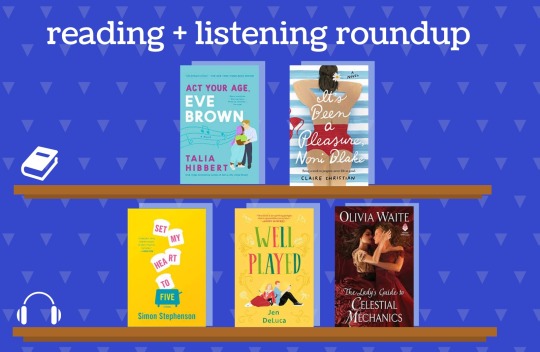
It was another week of soaring highs and middling mediocrity, but fortunately no DNFs. Notably, I’ve been dragging my heels on PIRANESI by Susanna Clarke, which has been sitting on my desk in gorgeous hard cover since release day. You ever want to love a book so much that you’re afraid to actually read it? No, no, me neither. Here’s hoping I get brave this week. In the meantime...
It’s Been a Pleasure, Noni Blake (Claire Christian), eBook ARC (US pub date February 2021). I loved this book so much that I’m already looking forward to owning the aBook once it’s available, just so I can relive the magic in a new way. Here’s my five-star NetGalley review:
I have discovered the antidote to the unmitigated disaster that is the year 2020, and it is IT'S BEEN A PLEASURE, NONI BLAKE. I inhaled this book in under 24 hours and feel soul-satisfied in a way I forgot existed. NONI BLAKE is a rom-com that's so much more than a rom-com; it's as much a character study as LESS and as much a travelogue as WILD, with the sweetness of Mhairi MacFarlane, the delicious heat of Sally Thorne, and the humor of every best friend you've ever gotten drunk with. It is, in a word, perfect.
When I say this book has it all, I am not kidding. In it, you will find:
- an average-bodied woman finding sexual empowerment and body positivity
- a Scottish book boyfriend for whom you do not need to travel through time
- healthy adult friendships
- A+ Bechdel Test score
- adventurous, consensual sex that is at times hilarious and at other times really, really hot
- situational comedy that will legitimately make you laugh out loud
- adults who talk openly about their feelings in an authentic, mature way
- portrayals of grief that range in severity from mourning the loss of an unborn child to coming to terms with years of self-criticism and negativity
- rich, descriptive prose that does not drag down pacing
- excellent plotting, perfectly balanced with the protagonist's complex internal journey
...the list goes on. This book is joy exemplified. I can't wait to give it to every woman I know. My only complaint is that the world needs this book immediately to inoculate us against the tidal wave of awfulness bombarding the globe, and yet it won't be released until 2021.
Notably, Australian readers have access to NONI BLAKE as of... today (!), so if you happen to be reading this in Australia, please do yourself a favor and buy this book immediately. And if there’s someone you especially like elsewhere in the world, maybe box up a copy and spread the love.
Act Your Age, Eve Brown (Talia Hibbert), eBook ARC (pub date March 2021). I know, I know -- how many contemporary romcoms with the exact same title structure can I read in a single week? Real answer: 2. But based on how fabulous both these titles were, I’m open to more. Here’s my four-star NetGalley review:
I've decided it's entirely impossible to read the Brown Sisters series without feeling amazing. Hibbert's writing is so smart, funny, and full of A+ banter -- not to mention scorching-hot heat -- that it almost feels like we don't deserve her books' nuances, diverse representations, and patriarchy-shaking feminism.
But we do deserve it, actually, and it's all there in ACT YOUR AGE, EVE BROWN.
If at first Eve seems flighty and difficult to connect with, don't discount the intentionality of her characterization. In a tidy narrative trick, Hibbert gives us the very experience that defines many of Eve's friendships: while the youngest Brown sister may have made a great first impression in Chloe and Dani's books, her flightiness feels off-putting once she takes center stage. But sticking with Eve -- instead of pushing her to the margins of our two-person social circle -- has a massive pay-off, as she soon reveals herself to be intensely focused on helping others, spreading joy, and baking delicious cake. It's a side of Eve too many of her "friends" never get to see -- but Reader, we do. And it turns out, Eve is a wonder.
Many of Eve's quirks align with behaviors on the autism spectrum; while Jacob's autistic presentation is perhaps more conventional, Eve's traits are equally validated by Hibbert's sensitive, nuanced treatment of the disorder. Romance + autism usually means antisocial behaviors, rigidity, and/or Asperger's-like presentation (The Kiss Quotient/Bride Test, The Girl He Used to Know, The Rosie Project... the list goes on). But ACT YOUR AGE explores the all important "spectrum" side of "autism spectrum disorder," and urges us to resist believing we understand what these labels mean just because we understand one small aspect of a very large picture.
All of this happens while a truly compelling, heart-melting romance unfolds. Eve and Jacob are incredibly fun to watch, and Hibbert keeps things moving at a lovely clip. I especially appreciated her resistance to the "h/h have to spend totally unnecessary time apart after an argument/misunderstanding" trope in Act III, which is a convention I would happily see go the way of the dinosaur.
Fair warning to your TBR pile: If you don't reread Chloe and Dani's books prior to picking up ACT YOUR AGE, EVE BROWN, you're going to want to afterward. There's simply no other way to maintain the rosy glow of post-Hibbert reading.
Finally, I'm predicting here and now that Mont, Alex and Tess are the next sibling trio to get the Hibbert treatment. (Please? Like...PLEASE please?)
Set My Heart to Five (Simon Stephenson), aBook (narr. Christopher Ragland, Rachael Louise Miller, Lance C. Fuller). If you combined the signature humor/love combo of David Nicholls, the deeply felt nostalgia of Ready Player One, and the bots-with-feelings hypothesis of Spielburg’s AI, you might come close to understanding what makes SET MY HEART TO FIVE so good. In the year 2054, the world has taken some unexpected turns: humans have accidentally locked themselves out of the internet, Elon Musk blew up the moon (also accidentally), and humanoid bots have been integrated into society as second-class pseudo-citizens. We meet Jared -- bot, dentist, cat-owner -- who has begun to experience curious malfunctions. With a friend’s help, and a heaping dose of old movies, Jared realizes he can feel real emotions. He resolves to journey west to Hollywood, where he’ll write a movie that changes the way humans view bots and paves the way for his bot brothers and sisters to enjoy the full range of human experience.
Jared’s explanations of human behavior provide a satirical commentary on our curious, often contradictory behaviors (”Humans. I cannot!”). Since films from the pre-bot age figure so prominently in Jared’s emotional awakening, that same satirical analysis is applied to movie synopses, which are rendered with necessary frequency but occasionally feel like overkill. The book relies heavily on a lovely trick of narrative reciprocity; Jared is on an archetypal hero’s journey, even as he strives to write a formulaic screenplay according to the “golden rules” of the fictitious script expert, R.P. McWilliams. But SET MY HEART TO FIVE never feels hackneyed, and in more than one way proves the rule that great stories are all in the telling.
With the innocence and clarity that can only come from being something of a stranger in a strange land, Jared embraces his existence with infectious enthusiasm and charm. It’s virtually impossible not to cheer for his success, even as we’re warned again and again that a great story will “eff us in the heart” at its conclusion. Audio is brilliantly narrated by Christopher Ragland, who manages to imbue the bot cadence we expect with believable nuance and big style.
Well Played (Jen DeLuca), aBook (narr. Brittany Pressley). I’ve got bad news for fans of WELL MET: If you wondered whether your enjoyment of Deluca’s ren-faire romcom debut of 2019 was due in large part to the book’s setting -- and more specifically, the way h/h’s interactions at the faire advanced the storyline -- the answer is yes. And why is that bad news, you ask? Well, because WELL PLAYED has none of the crackling Emily/Simon tension that carried the first book through its narrative stumbles. In book 2, the glacially slow Act I relies heavily on Stacy’s recitation of what makes her life humdrum, and a long series of email exchanges we *know* are coming from the conspicuously introduced Daniel -- even though Stacy, apparently suffering a traumatic brain injury, convinces herself it’s idiot playboy (and Daniel’s cousin) Dex. Sorry not sorry for the “spoiler,” which is impossible not to see coming from many miles away. Once this pseudo-conflict is resolved, the book boils down to situational fluff: a wedding, a squeaky mattress, the literal number of pumpkin spice lattes Stacy drinks over the course of a month. If it sounds like this is not a plot, that’s because it isn’t. The romance is low-stakes, the “uncrossable divide” that eventually separates h/h is the width and depth of a puddle, and the last third of the book is pretty much solely devoted to setting up a Mitch/April romance in book 3.
Notably, I found references to Stacy’s body-consciousness extremely strange. If we want to normalize average-sized women in romance, maybe we do that by not including, apropos of literally nothing, how “unflattering” woman-on-top sexual positions are?! Stacy is not characterized by self-consciousness, so the moments when her interiority veers toward self-criticism don’t feel necessary. I’m not saying these aren’t authentic thoughts and feelings plenty of women have, but an editor should have pushed DeLuca to answer the question to what end? Why include body hyperawareness in the precise moments when it appears? Like too much of the prose in WELL PLAYED, these inclusions felt like word-count boosting instead of dynamic character development or plot production. Sad as I am to say it, this book was a missed opportunity that shows the danger of rushing book 2 to market.
The Lady’s Guide to Celestial Mechanics (Olivia Waite), aBook (narr. Morag Sims). This book has been on my radar since its publication last summer. Gorgeous cover aside, I’m always here for diverse historical romance. Sadly, for me, the external stakes here were simply too low, and relied overmuch on the baffling revelation that men -- especially in this historical moment -- underestimate and undermine women. I never felt discernible chemistry between Lucy and Catherine. This could be due, in part, to Morag Sims’ narration, which pitches Catherine’s voice in a low, husky range that accentuated the women’s age difference. From the outset, we learn that Catherine is the widow of one of Lucy’s father’s colleagues; while Lucy is the more sexually forward woman in this partnership, there’s something a little An Education about the whole arrangement.
On my radar this week:
Piranesi (Susanna Clarke)
A Deadly Education aBook (Naomi Novik)
We Can Only Save Ourselves ARC (Alison Wisdom)
Angel in a Devil’s Arms (Julie Anne Long)
The Project ARC (Courtney Summers)
The Love Square ARC (Laura Jane Williams)
#book review#ebooks#audiobooks#amreading#the lady's guide to celestial mechanics#well played#act your age eve brown#it's been a pleasure noni blake#set my heart to five
0 notes
Text
A9 Final Pitch
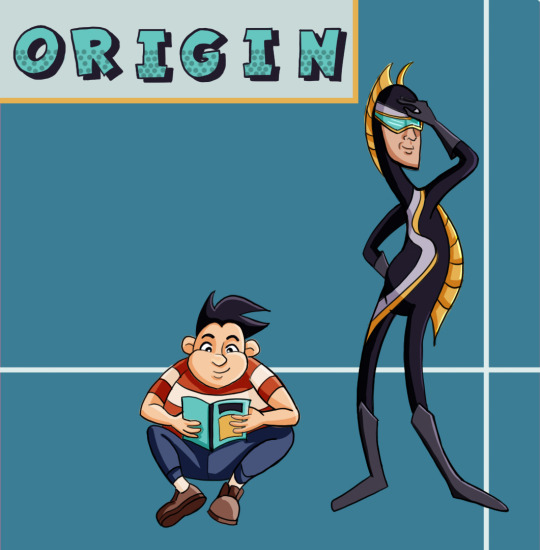
Wow! After nine weeks, we’re finally at the end of the quarter...so without further ado, here’s a quick summary of the work behind ‘Origin’.
Theme: Appearances can be decieving/life isn’t always black and white
Logline: When Dennis -a superhero-obsessed boy- is dragged to his dad’s office for a ‘Take Your Child to Work Day’ he comes face-to-face with some titillating family secrets. Could this be the origin story for Voltaic City’s newest crimefighter?
Link to final animatic: https://www.youtube.com/watch?v=j0V-kj4Sc9Q&feature=youtu.be&fbclid=IwAR3npV64LbHoybTt2JF6xB35kJiMK4cPKXZCDfXtOLDYqATOlXm7SUYTqcY
In this version of the animatic, I addressed the notes about establishing (more clearly) the initial setting of the office, as well as changing the design of the desk that Dennis hides behind in order to make it more plausible that Eel Man wouldn’t be able to see him.
Supplemental Materials: This section ties in well with the characters/world
Dennis:
To rehiterate, Dennis is a seven-year-old boy who is obsessed with superheroes and comic books. He views his favorite comic book as his ‘guide to life’, believing that the world contained between the pages has the answers to everything. In a way, his attachment to comic books represents the very ‘black-and-white/good-and-evil’ view of the world that people have in their youth, because more traditional comic plotlines (of the past) tend to be very formulaic in that good always triumphs over evil.
In terms of new material, I reviewed the SCAD Animated Short handbook and developed a rough turnaround sheet and expression page for Dennis. After doing so, when this goes into production, I’m wondering if it might be a good idea to revist the hair design. As much as I enjoy the asymmetrical swoop from the frontal and 3/4 views, since this will be 3D, I’m not entirely certain if it will silhouette well from the sides.

The expression page for Deninis was a lot of fun to make: since he’s the main character and the type to wear his heart on his sleeve, I got to play with a lot of large facial emotions...His roundness makes him a lot of fun to sketch out.
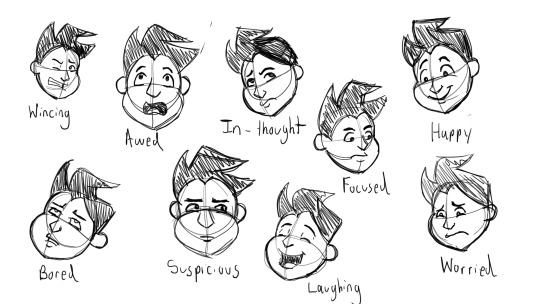
Eel Man/The Dad:
Eel Man is the secondary character in the film: he’s a systems analyst for a Tuna Company by day, and a super-their by night. He’s calculating, insecure and has a little bit of an invisibility complex. He began his life of crime after his job cut his benefits and began by selling classified corproate information to rival companies for money. Eventually, he went from hacking/digital theft and branched out into stealing top secret tech that was being developed by other types of companies: his theft of a sonar weapon (mentioned at the end of this short) is his first ‘big’ venture into typical supervillainesque crime which is why it made the news.
As a mid-level office worker, he feels very stifled and invisible at times. He definitely feels like just another cog in the machine and the noteriety he recieved in the criminal underworld for being a ‘super-theif’ helps stave off his greatest fear, which is going through life forgotten and unimportant.
Doing the turnaround sheet for him was a little tricky because I’m used to drawing him in poses that allow me to really exagerrate his ‘s-curve’ shape. But since characters are typically kept in a neutral pose for the sheets, it felt a little tricky to ‘straighten him out’, so to speak.
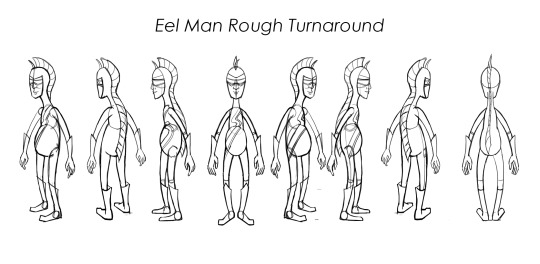
Unlike his son, Eel Man is a bit of an enigma in the short. He does need to keep a little bit of an ‘air of mystique’ so that it is plausible that Dennis could misinterpret his status of being a villain. Additionally, with the visor, drawing expressions was doubly challenging because it removed two of the main three components that really drive facial expressions (eyes, mouth, eyebrows). I did draw two images of him without the mask to hint at how he emotes around his family.
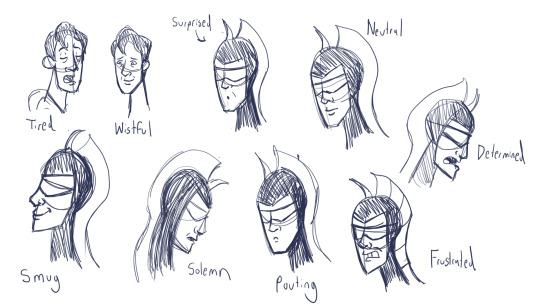
To round out the requirements for character in the Animated Short book, here are the action poses I submitted as a part of my pitch package to indicate how the characters will move. To me, I always begin with action poses before I even finalize character designs because it helps me connect character design, movement style and personality together. By drawing out how they behave, it helps me clarify (even to myself) a character’s identity/sense of being.
Dennis, ever the excitable kid, has very big movements. He puts his entire body into action and is very open with his behavior. I tried to remember how I moved when I was that age and personally, I remember being very impulsive and confident with everything I did: there was no planning or second-guessing, only action.
Eel Man also has exagerrated movements, but in a different way. His ‘s-design’ was chosen to specifically favor poses with strong lines of action: I really wanted to capture the dynamic poses typical to superhero comics, but also soften the seriousness behind the fight scenes by adding a slick, slithery element to his movements. He ‘slips’ and ‘slides’ everywhere.
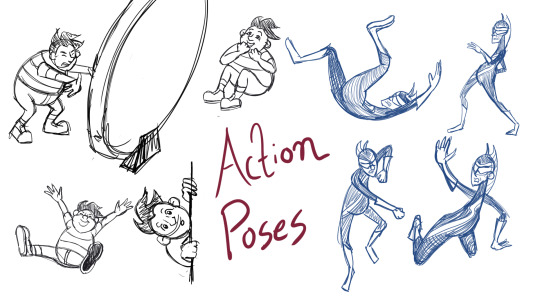
The World: Style, Lighting and Color
The short takes place in a corporate office and has two main sets: The cubicle and the lair. The cubicle is a very tight and slightly dreary space, so the colors will be mostly beiges and neutral tones to convey a sense of corprorate drudgery. The lightingin the office (during Act 1) will be fairly even to indicate that this is the ‘mundane world’...The story has not truly taken off at this point.
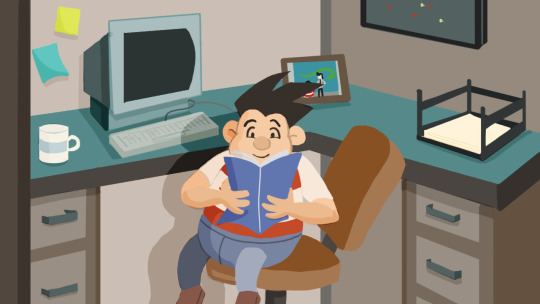
The quick color study here is a rough indication of the palette for the transition between sets. It carries over some of the beige/muted orange elements from the office set while the intense blue forshadows the color palette for the lair. This is the still I’m most likely to revist to finesse the color a little more so that it is congruent with the other panels. I’m not entirely sold on the color of the slide and want to explore what a blue-grey might look like...or perhaps a more saturated bronze color.
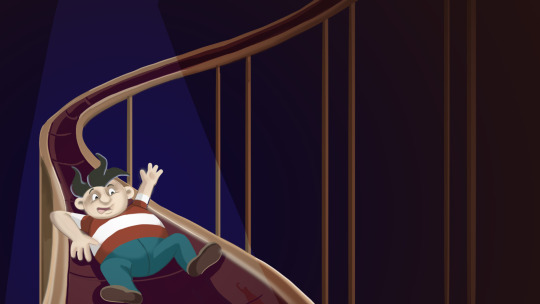
In Act 2, when Dennis is looking around the lair and starting to come up with ideas of what this foreign space could possibly be, the color palette changes to a high-pitched, limited palette of blue/blue green. This was heavily inspired by Lou Romano’s color key work on the Incredibles, because the vibrant, limited palette imbues the space with a sense of ‘otherworldliness’, removing it from what both Dennis and the audience associate with our ‘day-to-day’ reality. The lighting is bright and still fairly even because not only do I want the audience to be able to drink in full ‘grandeur’ of the set, but tonally, the emotions of the piece are still largely positive -it’s a moment of discovery. I also want all of the props (such as the giant coin, the costume carousel, the supercomputer etc) to be highly visible. The narrative relies heavily on props to drive the plot (with each component acting as an indicator that the dad is a hero) and its also important to establish props that will come into play during Act 3 when the fight sequence happens.
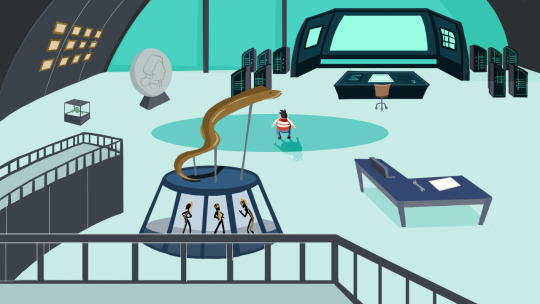
In Act 3, however, the lighting changes. As Eel Man (our secret antagonist) enters the set and Dennis gets visual confirmation that his guess was right (sort of), the set darkens a little and the lighting becomes very high contrast to create a visual intensity that foreshadows the conflict. The color palette of the set is still blue, but leaning a little bit away from the turquoise end fo the spectrum.
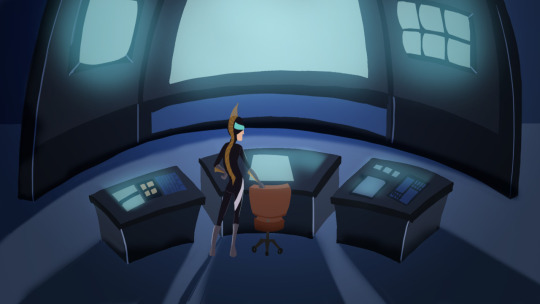
These are two production stills for the film. I chose Dennis and Eel Man’s first face-to-face interaction in the film to showcase because their relationship is what lends impact to the revelation off Eel Man’s true identity at the end. I attempted to do a little more color blending to convey a ‘3D’ quality to the image, but I feel like I want to keep working on it because currently, some elements such as Eel Man’s arm and hand could use a little less exposure to the yellow light for higher overall contrast. But overall, it serves its purpose to convey the general lighting in the scene. The scene is illumnated with warm yellow light to be visually misleading, conveying the beginnings of something wonderful and new...
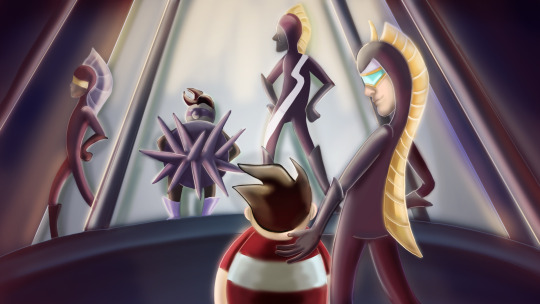
This is the second production still depicting the big ‘reveal’ when Dennis finds out that his dad is a supervillain. In this scene, he is illuminated by the LED lights of the television that is playing the broadcast that completely turns his worldview upside down. The teal highlights act as a visual calllback back to the palette of the lair,but now, the lighting is darker and far more dramatic to convey the sinister turn of the story.
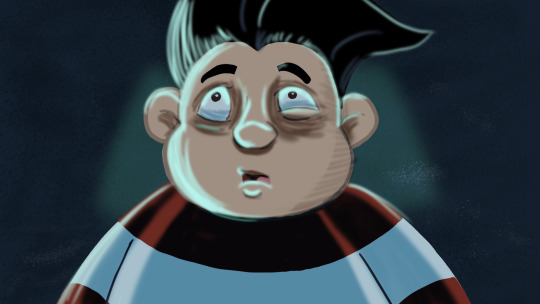
Looking ahead, I really want to develop a more concrete color script for this short. What I have now gives a decent indication of color, but I’d like to push the lighting and shading within the style frames to more closely match the quality of light within the production stills. I also feel like at least two more stills (one of the office and one more in the lair during Act 2) would strengthen the color development, giving people a more concrete idea oft the final ‘look’ for the short. However, I did end up prioritizing the fixes to the animatic, as well as the creation of turnaround sheets over a color script at this current time because those items were the ones definitively required by the SCAD Animated Short Handbook.
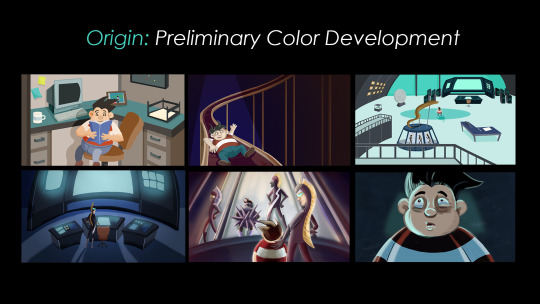
Why Animation?
My answer to this question can be found in my description of both the characters and the world. When it came to development, I was favoriting very stylized and exaggerated designs. The character’s shape based design language to inform their acting, as well as the saturated yet limited color palette for the hero world should work in tandem to create a visual universe that far removed from anything that the viewers can easily associate with our ‘day-to-day’ reality (i.e. live-acton). The stylization and exaggeration, which can only be accomplished via animation, serves to make Dennis’s conclusiion that his dad MUST be a hero more believable to the audience by lowering the suspension of disbelief: if the audience doesn’t have a comparison point to explain the unfamiliar space, it excuses Dennis’s runaway imagination.
Although this story could be done in live action, it would change the tone of the story to something a little more corny (similar to Disney’s live-action film Sky High). Even though I personally enjoy campy superhero stuff, in this case, it would tonally undermine the theme that ‘life isn’t always black and white’, which I would like to avoid.
Final Notes and What Comes Next:
Taking this pitch from start to finish was a really interesting endeavor, especially in seeing how the concept evolved over time. I’m a large fan of DC comics, so getting to play around with some of my favorite tropes was a definite plus with this story. I know I personally enjoy hero origin stories a lot...I think the stories people come up with to explain what could drive a person into acts of superhuman heroism/villainy are pretty interesting because they reflect the things that majorly impact people’s lives (loss of family, social injustice etc, etc).
In a way, Origin, for me is as much of a coming-of-age tale as it is a superhero story. Dennis’s discovery at the end, that his dad was not the man he thought he was is an amplified version of how at a certain age, you realize that your parents are not necessarily these godly, untouchable super-humans who can magically solve all of your problems. Awknowledging that life isn’t always easy is a, difficult, yet essential, part of growing up and I wanted to touch on that in my film.
But-with that being said- I’m finally going to reveal what I think would happen after the title card! Originally, I had thought of this idea as a pitch for a television show and I think that after the revelation, Dennis would agree to be Eel Man’s sidekick so that he could try and discover WHY his dad would become a villain. I think he would actively try to sabotage his dad’s villainous escapades, because he’s still a good-hearted character, but I think his loyalty to his dad would lead him to agree to be his sidekick so that he could try to better understand his father. I think that if it were further developed into a series, that you could have a lot of fun coming up with various ‘heroes-of-the-week’ that Eel Man and Urchin Boy could encounter...So in a way, this short could double as a good ‘hook’ for a pilot.
In terms of moving forward with the production of the short, I’m really looking forward to seeing what my future teammates will bring to the production. The thing I enjoy the most about being an animation student at SCAD is being able to discuss and develop ideas wth other people who also love stories and storytelling. Everyone has such a different and unique way of viewing the world, that even being a small part of their stories during the feedback process makes me happy.
In the end, this was rewarding experience because it reminded me that storytelling is about finding common ground with other people.
Well...Onwards and upwards, I guess!
0 notes
Note
I have quite a few ideas for fanfics and original stories, but I get so bogged down in worldbuilding and analysis that coming up with a plot for people to actually read is much more difficult. Given your extensive headcanons for "The Fairly OddParents", how do you manage it? How do you snap out of Worldbuilding Mode, get into Storywriting Mode and stay there long enough to accomplish anything?
That… is a good question. Well, let’s walk through this together. This is gonna be a VERY BIG one (over 10k words because I’m just that extra), full of behind-the-scenes tidbits for my fanfics, but nothing I’d call super interesting for those who aren’t writers, so feel free to skip this one~
TL;DR: I’m weird. I work best when I choose how to manage my time. Spring break? Time to draw and watch cartoons! But adjusting my schedule so I can do homework AND study AND talk with friends AND answer Tumblr Asks AND research AND write? I will stop procrastinating in an instant, because suddenly there’s no time to lollygag. Why do you think I created the Mikey askblog? I was balancing my time suspiciously well and it was legit having negative effects in my life. I needed to add more pressure to my plate to force myself to work. I’m bizarre. You gotta make the time and have the right environment, I guess!
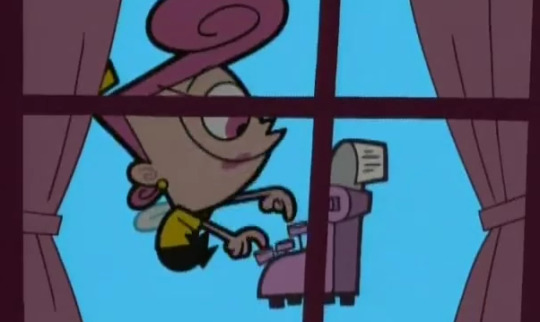
How to Write More Good: It’s Getting Drafty In Here!
(AKA, Riddle giving general advice on writing early drafts!)
.:: STARTING WITH AN IDEA ::.
(+ Basic Worldbuilding and Character Design)
My first FOP ‘fic was Baby, You’re a Rich Man. It came to be because “School’s Out! The Musical” was (and still is) my favorite episode of the series. After rewatching it half a dozen times, a few things occurred to me:
H.P. and Sanderson were moving away from the sunset in the opening scene, towards Kansas.
Flappy Bob grew up in an orphanage in Dimmsdale, California.
H.P. and Sanderson couldn’t use magic during that opening scene.
It would be more rational for them to take Flappy Bob to Pixie World and get new wands than it would be to drive all the way back to California.
So, that’s how I got the basic idea of, “How did that caring for a baby on a magic-free road trip go?”. While my headcanon base was not as extensive as it is now, I had pinned down the Pixie Wolbachia headcanon. That gave me the starting point I needed to strive into writing this ‘fic with confidence.
As for where my worldbuilding came from in the first place, my personal preference was to break the mold I saw. For example, I chose to focus heavily on real-life insect biology and science in my fanwork. Here are a couple of worldbuilding questions to get your gears turning:
How does society feel about expressing emotions in public?
What are society’s views of marriage?
Bathing? Eating? Taking vacations?
Greeting one another? Holidays? Schooling? Calendars?
Work hours? Who has jobs? How many? How does one get a job?
Living with those you’re related to? Aren’t?
Addressing figures of high status?
Look for basic, “obvious” things that we do in our lives and twist them, and maybe make something that would startle us totally acceptable in your work. It sounds like you’ve made good progress, but I thought I’d toss some thoughts out there for anyone who wants to write, but is lacking ideas in this area.
When writing fanfics, I would ask yourself questions like:
How closely do I want to stick to canon?
My family used to have this giant bucket of honey that said on the side, “Nothing added, nothing taken away”. In my case, I stick as close to canon as possible, and try to act with a policy of “everything added, nothing taken away”. That’s my personal preference, and it makes things easy because, with a few exceptions, no one has to try to remember which episodes are canon in my work, or who is on good terms with who in an AU.
What plot holes will my story address, avoid, or answer?
As mentioned above, I was curious about how H.P. and Sanderson made it to California, why they picked Dimmsdale, and how a magic-free road trip for people who rely so heavily on magic might have gone down. I had the opportunity to explore character relationships and the magic system of the FOPverse.
What worldbuilding elements did canon give that I can expand on?
Wands, Pixies Inc., godchildren, memory wiping, other species, fantastic racism, pixies all looking alike, magical creatures getting drunk on candy and soda, Da Rules…
What is my take on Character A?
I see Sanderson as loyal and devoted; he’d sacrifice himself for H.P. and can’t be convinced to betray him. He craves recognition for this, and is desperate for H.P. to refer to him as his son. He doesn’t know why this is so important to him anymore, just that it’s always been something he wants. He’s also an envious sort who is bitter because he’s head of the complaints department and isn’t vice president of the company.
Someone else might see Sanderson as a suck-up who flatters H.P. beyond belief in the hopes of taking over someday. Or perhaps as a bumbling idiot who only keeps his job through nepotism. Or perhaps H.P. is grooming Sanderson to inherit the position of Head Pixie and treats him like a puppet for political reasons.
My works would be very different if any of these had been my angles. The great thing about headcanons is, we can all have our own!
How have A’s interactions with B changed from canon?
My Sanderson has separation anxiety. I based this off canon, because he always follows H.P. around despite having the lowly job of working in the complaints department. However, his separation anxiety isn’t confirmed by canon.
Someone could say he was only working in complaints in “Pixies Inc.” because the company was transitioning now that they’d bought out Fairy World, and that in reality he is (or was later promoted to be) the vice president, and I would support this interpretation even though it differs from my own.
Do I know how they speak?
I wanna write some “Bunsen Is a Beast” one-shots, but it’ll take some time for me to get a solid feel for these characters. To stay in character, you have to understand their background, vocabulary, facial expressions, body language, movement, eye contact, tics, what they do when they’re flustered or startled, how they laugh…
I fell in LOVE with BIaB’s use of hand gestures and body language, because FOP and DP always came off a little lacking in that area to me. Like. If there is any body part I find attractive, it’s hands and the way they move, just- Hhhhhh asdfjhslfsdfjs bury me in this JUST LOOK-
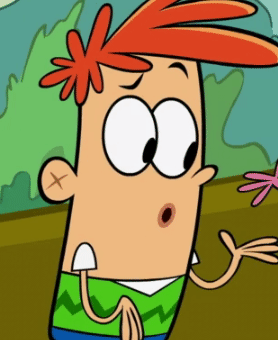

Keeping characters in character is the make-or-break point of enjoying fanfiction for me. I’ve read long ones that use (mostly) proper grammar, but disliked them because characters were OOC. Likewise, I’ve read pieces with less-than-stellar conventions, and loved them for the believable character portrayals. Sometimes I get lucky and manage to find something that scores high marks in both areas.
Some people don’t mind a little OOC-ness! But I don’t like it (Might be an author thing, being a writer of original works myself). I like fanfics that contain references to CANON DETAILS. Research. Thoughtfulness. Love and care. Expanding on what the creator brought to life, not twisting it so much that it seems like you wrote your OCs and are calling it fanfiction just so people read it.
I mean, I like the show because I like what canon gave me, right? I drool over characters like H.P., Youngblood, and Mikey because I sit there with my chin in my hands and think, “You are such a great character. I wish you could be my character. You are a dang fine character.” It just kinda bothers me when people stray too far from that (I totally support portrayals that differ from my own, but I do favor the guidelines of “everything added, nothing taken away”).
Speaking of characters, characters might change as you write more! Freaking Gavin certainly comes to mind.
My pixie character Longwood was going to be my serious fellow. He was written that way in every scene (of which there weren’t a lot for him yet). But then I wrote the “Solo” prompt (the proctoring of Rosencrantz’s latest placement test) before finishing Baby, You’re a Rich Man.
The very first scene to mention how much of a sucker he is for kisses was the “You have a lipstick stain beside your ear” line, and how Longwood’s hand flashes to the exact spot on his cheek. I was going to leave it at that. But then it slipped into Rich Man, and I couldn’t resist. It took off.
Not only did this end up influencing Origin, but it majorly affected Frayed Knots, Rich Man, and the 130 Prompts project. Bit of a flanderization, but he never lost his other traits (kleptomania, phobia of blood) and it’s unlocked so many wonderful opportunities and plot points.
The entire concept of gynes stemmed from around this, for example, as well as some conflict with Sanderson and H.P. (Longwood wanting to marry despite H.P. telling him not to, along with Longwood’s habit of trading company secrets in exchange for kisses). I can’t see him any other way.
Then Wilcox was going to be my serious character. He ended up with a physical addiction to shapeshifting, loves to be a rabbit, and now wants to marry a rabbit. Well.
Characters can change from your original plans for them. Let them go. It’s their story before it’s yours. The piece will almost certainly be better for it.
TIP: Don’t leave yourself sitting in front of a blank screen. Put something down. I usually keep a collection of town names on hand if nothing else, because I work MUCH better when there are words already there.
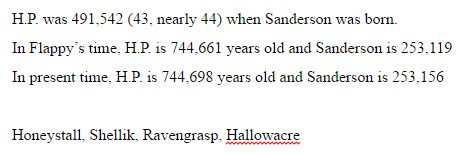
These notes have been sitting under the table of contents of Origin of the Pixies since the beginning. If you’re as familiar with my work as I am, you may notice that those four town names have never come up yet. I grew fond of them and wanted to save them for either a really good town, or for original projects.

Here are some other notes up there. The first one is a list of people who are immune to magic, as mentioned in “Crock Blocked” (though it’s supposed to be “new wave”, not “new way”). The second is a deleted line from “Rain Dance” that I really like, but haven’t been able to use yet.
Here are some notes from the beginning of Knots:
Use ‘in which’ subtitles
Maternity colonies
Group of huddling baby bats = creche
“It’s a bit dear” = It’s expensive
“I’ve got the right hump” = I’m irritated
“Plump for something more like…” = Use something more like…
“I’m easy” = I’m laid back; I don’t mind
“All right, darling?” = How do you do?
Chips = Crisps
French fries = Chips
Lift = Elevator
Using “You know what I mean?”
Knackered = Exhausted
Gutted = Broken up about
Gobsmacked = Completely shocked
“I cocked up” = I badly messed up
Blinding = Incredible
Cheers = Thanks
Ace = Expert at
A damp squib = A failure
Chunder = Throwing up; for drunken nights
“Oh, mate, that’s brilliant!”
Fortnight = Two weeks
“She gave me a real bollocking” = She scolded me
“Nice one, really” = Sort of sarcastic; “Great job” or “Nice going”
Dodgy = Not very good (Items / thoughts / actions / people)
Scrummy = Tastes very good
Kerfuffle = Skirmish
“That’s a load of tosh” or “Don’t talk tosh”
“He tried to skive off work” = Sluff
Yup! Stereotypical British slang I’ll probably play around with! I don’t plan to use all of it, and I don’t want to use them too much, but I jotted them down.
I also have a list of symptoms for the iris virus STD, but I don’t think that’s appropriate to share here. Here are some notes from my “Danny Phantom” ‘fic about Youngblood, No Anesthetic:

I used to have his sisters up there, before I moved them to an Excel file:
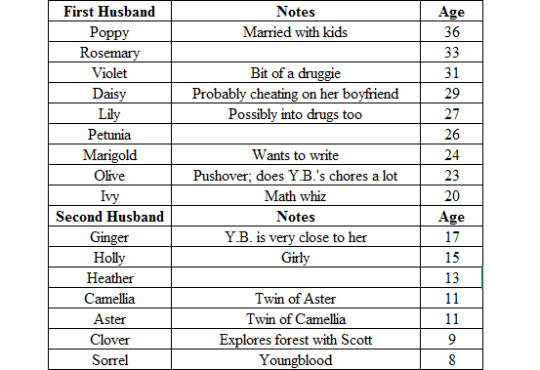
Excel and such can be a great tool for writers to keep their character notes. Stay organized. Once you get your notes written down, you can stop thinking about them so much (I’ll mention the brain’s response to saying “I can move on now that this is noted down” later in this post) and free up space in your head to think through stuff that hasn’t been finished (aka, the story).
The point of me showing all these is, this is something I always do. You just have to start somewhere. Don’t sit at a blank screen and procrastinate. You’ll get analysis paralysis. The first draft is supposed to be a DRAFT. It can change later. If your first draft is perfect, you have bigger problems to worry about, because you probably have magic powers and a world to save. Write more than you need to in this stage- figure out what to cut later.
Need ideas for what to jot down? Figure out more worldbuilding basics:
Where are people getting their food? Water? Shelter?
Social interaction?
Money?
Materials to do the job to get the money?
Books, toys, writing materials, entertainment?
Eating utensils?
Rights?
Addictions?
Love?
Pets?
What about your protagonist? Main personality traits? Quotes?
Family, alive and deceased? Family history? Heirlooms?
Neighbors?
Nervous habits? Embarrassing habits?
Things they’d lie about?
Things they’d never want anyone to know about them?
Deep dark fears?
Things they would share on their Tumblr blog?
I would easily be able to answer all of these for my FOP work, and several of them for my fantasy novel (currently nicknamed “Stars and Finches”) too.
Now, how can you hint at these things in your story? What happens if you take one of those away, or threaten to? Answering the question of “How would THIS character react?” is thrilling for me, and something that drives me from worldbuilding mode into writing mode.
We all know that it’s common for characters to not be mentioned as needing to go to the bathroom. But remember, your characters are mortal too (or, they’re not!) If they have needs, keep that in mind.
In the first draft of Rich Man (not the outline, but the actual draft), there was no mention of Sanderson being thirsty in the early chapters. I added it later because I realized how long he had gone without drinking in hot and dusty Kansas, so then we end up with these scenes:
Chap 1:
I pulled myself together, licking at my dry lips.
Oil dripped in silence, and I remembered how dry my mouth was, full of dust and maybe a bit of blood.
Chap 2:
Water. Water. Water! I hadn’t wanted to get my hopes up just in case I was wrong, but as I approached the small army of metal animals encircling the watering hole on Hole 8, I felt hope swell within me. I knelt between a hulking elephant and a slender zebra near the little wooden bridge. Hugging Flappy to me with one arm, bracing myself with the other, I drank until all the dirt and corn dust had washed from my mouth. It tasted like whipped cream. When I next licked my lips, actual wetness spread itself over the cracks.
Characters needing to meet their needs can be a great plot device if you’re groping for ideas! In fact, I said one time that my tip for overcoming writer’s block is as follows:
Your character is either hungry, thirsty, exhausted, second-guessing themselves, learning a new skill, overcoming a naturally-formed or man-made obstacle, or that really great plot point you’re excited for is coming up next and it’s time to dialogue your way in that direction. Rinse and repeat.
(On the subject of writer’s block, I sometimes record myself reading the dialogue I’ve already written. Bonus points if you can get the voices right, though I sometimes find it difficult to switch between multiple ones. If you can get really into it and carry on a long conversation with yourself, perhaps you can transcribe some of what you say to your writing.)
.:: THE FIRST OUTLINE ::.
Confession time: I’m not awesome at plots myself (That’s why I tend to write long, drawn-out pieces, because the plot then becomes “development and discovery”). But Rich Man’s road trip idea came with a built-in plot. It was supposed to be pretty quick and done.
Like. A sixteen-page long one-shot. Not an 85,000-word novel. So, what I did was, I just started writing and let the story unfold as I went. This is what I knew was going to happen:
H.P. and Sanderson find Flappy in the cornfield
Sanderson gets shot in the wing so he can’t fly for the rest of the story; the stakes have been upped because his ability to escape is limited.
Sanderson and H.P. get separated in the field and Sanderson panics because of his separation anxiety. He tips over the edge and H.P. scolds him for this when they meet up again.
Everyone goes to the minigolf course. H.P. puts Sandy in charge while he plays golf by himself. Sandy is torn between staying at the course or leaving for food, because he and Flappy are hungry. He also ends up losing Flappy, but he’s found again later.
In the morning, everyone leaves and they get back in the car and start searching for food. Flappy needs baby supplies.
H.P. and Sanderson disguise themselves with a trench coat or something from the back of their truck and get supplies from a gas station. While outside the station, they get backed into a corner. Sanderson ends up running inside the station with Flappy while H.P. got caught and dragged off.
Sanderson tries to balance Flappy’s needs with figuring out where H.P. is and how to rescue him. He feels alone and miserable, but eventually he manages to reunite with H.P. somehow.
H.P. and Sanderson make it to the base of the Pixie World Bridge just as it starts to rain, and manage to get Flappy above the clouds, and arrive in Pixie World to dry off.
In the conference room, H.P. explains the loose outline for his plans, and Sanderson is put in charge of watching Flappy for the night.
Now, anyone who’s read Rich Man will realize instantly that something is very wrong. This doesn’t look much like the finished project. Where are Eunice and Quincy? Where’s the candy and the fence? Where’s Anti-Naelita? What happened to the soccer field? Jorgen? The sugar bar? The will o’ the wisps?
Simple: my outline was loose enough to give me wiggle room. Some writers prefer a strict outline, but I’m not one of them. You might not be either.
As you can see, I had a decent outline here. I had a good starting point, even if it was rough and many details were fuzzy. I got to this point by first marking general notes, and then asking questions and adding more notes:
I need to get from the cornfield to Pixie World.
What is the cornfield like? What time of day is it? What’s around? Who’s around?
What happened to the guy they hit with their truck when they spun into the corn? And how much did the collision / spin / impact jostle them?
How are they going to take care of Flappy?
They don’t have magic.
A baby will need to be fed and changed
There’s no way they have baby supplies in their truck
Where and how will they get supplies? How will they get the supplies to get the supplies? Who will they meet when they get it? What are the dangers?
I want H.P. and Sanderson to get separated.
How can we up the stakes?
I can take Sandy’s ability to fly, and discuss the ways magical creatures can die, and put Sandy in or near those situations so we can see him fret
Even if the audience knows that the main character survives (especially when writing backstories), the writer should strive to keep them on their toes with physical and emotional dangers
I love the idea of Sanderson having separation anxiety, so I’d like some of the focus on the story to be on that
I should foreshadow this by separating them in the cornfield for a short period of time.
What happens to Flappy when they separate?
How does H.P. take care of Flappy vs. how Sanderson takes care of him? Who is more capable: H.P. who has much more experience but is strict, or Sanderson who is more compassionate but makes many mistakes?
How do they get back together?
An injured wasp releases pheromones. I based pixies off wasps. I could do something with this.
I like the idea of Sanderson putting himself in harm’s way to trigger his pheromones, because it drives home how desperate and lost he is.
What’s my end goal? Why am I writing this?
I want to share my portrayal of these characters that I like, and maybe others will like these portrayals and characters too.
I’m interested in exploring the worldbuilding and magic system, and trying to bring all the scattered bits of canon that seem to conflict into a single consistent magic system with strengths and flaws.
There’s not a real moral here, or at least not a good one. It’s just sort of slice-of-life, and shows how much H.P. means to Sanderson compared to what Sanderson means to H.P., and just sketch an idea as to what their overarching relationship is.
I wanted to point out the Kansas/California disconnect and play around with a magic-free road trip.
This was enough for me to get started. Just keep asking and answering questions! At this point, I had no other ‘fics to refer to, so I threw in worldbuilding as I went along (Hint: Reference past experiences that helped one grow or made someone nervous. Compare things to something that belongs specifically in this world when describing colors, expressions, body language, or facial features. What reminds a character of their past? How can you make those things related to your ideas or to canon worldbuilding?).
I made things up as I went along, and tried to slip in worldbuilding:
What’s so special about this minigolf course?
Apparently Sanderson was born here
What was H.P.’s life like back then?
What is the course decorated like? Why?
I really wanted the tree Sandy climbs to be a maple. But how did a maple end up in Kansas? Hmm.
As adorable as being born at the golf course would be, how does that work with the time differences?
How the Big Wand works
How magical creatures breathe
Lines can get tangled
What wand providers do
Undoing magic (reversal fluid and signature codes)
Limitations on magic
Why wands are important
How wands work
In a magical sense
In a physical sense
Legal jazz and paperwork junk
Magic lines
Magic doesn’t work well in poor weather conditions
Tingle-fritziness
Snapping lines
How do babies get lines?
Tying lines
Three is preferred; too many or two few can compromise one’s health.
Magic dust
Non-magic users see what they expect to see if there is magical residue around (basically sweat; aka fairy dust)
Healing
Ability to fly
The energy field
Field-sight
Species variations
Magical politics
Mind wiping
Fantastic racism
Rules about interfering with neutral / evil parties on Earth
Court cases
Anti-Pixie society
Sanderson is reserved, likes singing, and is loyal to H.P., but Anti-Sanderson is boisterous, likes dancing, and usurped H.P.’s counterpart
What even was the previous 37-year plan anyway?
And how important? What did the Fairies think of it? Anti-Fairies?
Sanderson hates it when girls flirt with him when he’s just trying to fix the copy machine; it’s distracting and confusing
Inspiration back-up is maybe a thing? This is a really iffy subject
How did the Pixies become involved with Gary and Betty? Why THEM?
Sanderson is taking care of them because he grew fond of their parents after meeting them in this ‘fic. When the plan called for more human children to raise, Sanderson knew who to look into.
Sanderson is not company vice president, and is bitter rivals with the pixie who is
Who gives pixies milk? Foster mothers
Who was Sanderson’s milkmother? How did H.P. meet her? Does Sanderson remember her? Why isn’t she still around? Did she have kids? Are they his siblings? Why aren’t they around?
… Basically, if you have the choice between slipping in a world-building detail or falling back on an old cliche, the former is probably the better way to go. Of course, I myself hit a snag when I couldn’t figure out what Sanderson would know about H.P.’s past, so I started to develop Origin of the Pixies seriously.
Write the stuff you’ve already come up with. Try to see things from the perspective of someone who can’t see the inner workings of your head:
Is your logic sound?
Do you contradict yourself?
Do you think you’ve avoided plot holes?
Are your explanations confusing?
What questions might people ask? How would you answer them?
What if this story was written with different characters?
How would they try solving their problems? What would they know? Why DON’T the characters you chose to use react that way?
My advice is, don’t be stubborn with your outline. Be flexible. I mean, look at this note I added to Rich Man 8 when I originally posted it on deviantArt:
Idona’s presence, I think, might be worth a little explanation. First things first, I would like to throw out that I did not invent an OC to ship Sanderson with because I find romance necessary. I’m really not much of a shipper in general. This was always supposed to be a story about Sanderson, his boss, and a baby clown. So if you’re anything like me, you can breathe again.
[…] Idona was not supposed to be in this story. She isn’t in my original outline whatsoever. Even when I started thinking I might have Sanderson run across a will o’ the wisp, I was going to use one of the random ones. Literally anybody but Idona, because knowing her the way I’ve learned to [from writing Origin of the Pixies], there is no way she wouldn’t bring up romance, and I didn’t want that to even be a question in this story.Problem being that if we’re perfectly honest, based on Origin of the Pixies canon, most wisps would have either A) confused him with Longwood and attacked out of frustration (and I was really done with Sanderson getting physically beat on), or the more likely B) smothered him in kisses and such right then and there, O'Weskar v. Pixies Inc. notwithstanding, seeing as they know they have the time to have their way with him before he dies. And no way was I going that far. Either I had to change Origin of the Pixies, I had to invent pointless new wisp characters and introduce plot holes, or I had to adjust a scene in Baby, You’re a Rich Man that I wasn’t happy with.Using Idona surprisingly led me to the least possible romance and the best balance of sanity, if that makes any sense. Because she’s the only one who would ever see him as a person and respect his refusal, and not just take advantage of him. And I got to show Sanderson doubling back in desperate search of the only wisp he actually dislikes rather than has more neutral feelings towards. That was nice. Not that… it means much to you all, not having read Origin of the Pixies yet. So, yes, I’m entirely aware that this scene probably still seems out of place with the rest of the story, but I assure you, every word Idona says, her fascination with Sanderson in particular, and the fact that wisp damsels come out in the rain nowadays makes complete sense. And, for those of you who actually were itching for romance, take this and sit tight. Next time we’ll talk with Longwood and someone’s gonna get busted.So if Idona weren’t here at all then their conversation would have been replaced with more of Sanderson’s rambling which, while it was my first intention, did not go as well as I hoped. It really went on for about ten pages and I kind of. Pushed him. Over the brink of reality and had to start over. There was a lot of grass-eating involved. I had to stop when I ran him into the ground because I had little choice but to make Jardine stumble across him while he got his dirt, and that rang like a cop-out. It was all much too OOC even for my take on Sanderson, I realized when I sat back and took a second look. So now you get Idona and I’m 100% certain the story is better for it. It did fix a major plothole in a later scene, after all.
This is just what, after twelve years of trial and error, seems to work very well for me. Some people might be driven crazy by an outline that said, “I don’t know how they meet up again, but I’ll figure that out when I get there”.
Personally, I let the characters guide me. If you’ve read Rich Man, you know that Sanderson is actually the one who gets captured, and that he ends up bonding a bit with Thomas over music. I came up with that love of music idea when I reached that scene.
That’s what works! Alternatively, if I were more of a planner, I could have drawn up a character sheet for Thomas in advance, and I might have written, say… “Flattery is the way to his heart”, and gone into the scene with that character detail in mind, and Sanderson could have flattered his way out.
In the latest chapter of Origin, I had the scene where Sanderson hugs the yoo-doo doll and the scene where H.P. stabs the arrow into it written out months ago, but I didn’t figure out where or how they got the dolls (or who was guarding them) until I actually made it to that section of the chapter.
Just remember: Better to have a rough draft than nothing at all! If you feel paralyzed, start asking questions and trying to decide how you can answer them in your piece without infodumping too much! Unless you infodump the way I did when Sanderson went on his rant(s) in Chapter 1, I guess?
.:: FIRST WORDS ::.
Okay, let’s back it up. We’re pretty far into this post now, and yet the first thing I ever do when actually writing a story is, throw down all the scene snippets I’ve been keeping in my head before creating the document.
Ex: In Frayed Knots, here’s one scene I scribbled downvery early-
The glimmering of her translucent wings cast rainbows across the squares of light leaking over the otherwise dark floor. My core twisted in a knot. I covered my mouth and nose with my fingers, choking on literal butterflies because the sight was so sickeningly pretty and good and pure that it made my head spin and the blood thump in my neck. It went against every Anti-Fairy instinct, every Anti-Fairy cultural norm, every Anti-Fairy schooling lesson, every Anti-Fairy wands and wings talk-
And I liked it.
Wanda placed her hand to my forehead. “Are you all right? Your face is flushed purple, but your forehead doesn’t seem overly cold.”
- and I moved from stuff like that onto the next chunk, which was writing the scenes that appear in both Knots and Origin from the viewpoints of Anti-Cosmo and H.P., respectively, and making them each distinct. For example-
Origin-
Against his best efforts, Anti-Cosmo pulled a more amusing face than he would ever admit to and handed me back my mug. “Blimey! I really don’t know how you can drink this putrid stuff all day, old sport.”
I slid his tea cup and saucer across my desk with the end of my pen. “And I will never see the appeal of this sickly sweet water, either. I can hardly function without my morning coffee dose.”
“All the more reason we should align forces, I think. The coffee is yours, but all the tea in the universe shall be mine. Ahahaha!”
“And the sugar?”
My door exploded open as Anti-Cosmo was working through his, “I say we split the difference”. He yelped and dropped the cup he had just picked up, and it spilled steaming tea all over his lap. Brown dots splattered across the papers on the desk between us.
“Sanderson,” I said, trying not to focus on the bead of sweat creeping down my forehead. “This is definitely not a good time to make a fool of yourself.”
He surveyed the situation fast and pinged up a handful of small towels for Anti-Cosmo. To me, “Longwood and Smitty are trying to kill each other down in the food court.”
“Oh, blitz.” I shoved my chair backwards and pushed past the anti-fairy. At the door, I turned back to him. “I would suggest you remain here, Anti-Cosmo. For your own safety.”
“My own safety?” he repeated, utterly perplexed. He had his handkerchief balled in his blue hand, even though tea was still splattered across his prim shirt and dark pants. His green eyes narrowed with glinting suspicion. “I’m not certain this isn’t a clever attempt at a trap, H.P.”
Knots-
I fiddled with my wand beneath the edge of his desk. I’d seen what that stuff did to him the morning after we’d spent that night together during the war. “Hot drinks don’t appeal so much to anti-entities.”
“Just taste it, tea-drinker,” he coaxed.
So I did. It stung the cuts along the roof of my mouth, just as I’d expected to, but I did not spit my swallow out, and I’m very proud of that. “Blimey,” I said mildly as I lowered it. Struggling to maintain an even expression, I passed back his mug. “I really don’t know how you can drink this putrid stuff all day, old sport.”
“And I will never see the appeal of this sickly sweet water, either,” he said as he returned my teacup. “I can hardly function without my morning coffee dose.”
I smiled and lifted that softly-steaming cup of sweetness to my nose. “All the more reason we should align forces, I think. The coffee is yours, but all the tea in the universe shall be mine!” My proposal ended in a small cackle.
He tilted his head. “And the sugar?”
“I say we split the difference.”
The door burst before I finished. Tea spilled down my shirt and over my legs. I flinched and probably let slip a squeal as I grabbed at the insides of my coat. The Head Pixie’s face bled into mortified white.
“Sanderson, this is definitely not a good time to make a fool of yourself.”
I rotated my chair partway around, squeezing the wet front of my shirt in my fist. The flustered pixie kept one hand pressed to his hair, but he spared me a fleeting glance. As he pinged up an unsteady stack of gray towels above my head, he blurted, “Longwood and Smitty are trying to kill each other down in the food court.”
Spitting unprofessional curses, the Head Pixie launched himself over his desk, caught his foot on the edge, tripped, and slammed hard into the ground beside my feet. He scrambled up again and flew through his door. Then he poked his head back in. “I would suggest you remain here, Anti-Cosmo. For your own safety.”
I cocked my ears forward. “My own safety? I’m not certain this isn’t a clever attempt at a trap, H.P.”
Of course, I guess you don’t really have that luxury, huh? Having another story to refer to? So sharing these blocks was kind of pointless.
Some scenes may get cut. Even ones that you thought you liked. If you’re a writer, I’m sure you’ve heard the phrase “Kill your darlings” before.
That’s especially the case when trying to publish, as you’re bound to a certain length. Fanfiction is nice because you can be as long as you want. But still, I would advise you, if something’s not working? It’s hurting. Drop it. Keep only scenes that contribute.
Could I have written several more chapters in Origin about H.P.’s life in Kalysta’s burrow? Heck yes. Could I have written about the years he spent as a servant / butler to Cattahan? Definitely. But they disrupted the flow, and really, the audience didn’t need them. Wield the timeskip wisely.
.:: DIVIDE AND CONQUER ::.
Okay, so you know I scribble down what I can think of at the time, right? What if I don’t know a detail? Should I stop and work it out? Spend an hour or two researching right then and there?
Nah. I throw down an underscore and keep moving. Later, I can use the search feature to show me all the underscores and fill them in during the second draft, when I have more time for fact-checking like that.
This is my favorite example of the underscores, from the “Think Positive” prompt, because every time I find this scene again it just makes me snort:
“-pixies over the millennia. Surely you can loan me some advice to raising mine? I don’t know the first thing about raising a child. I’ve never held a pup in my life.”
The Head Pixie scratched his chin. “Aren’t you Mr. Genie Conservation Program?”
“_.”
“Right. _.”
Anti-Cosmo shoved back his seat and lifted his wings. “_?”
“_,” he said as he took another sip of soda.
“_.”
“Wasn’t that the very first thing I said?”
“But do you even know how Anti-Fairy rrreproduction works?”
The most interesting conversation.
Anyway, I knew that I wanted these two to bounce off one another. I knew A.C. was acting high-strung, and H.P. was more relaxed. I wrote everything for this prompt that I could think of at the time one night. It’s been sitting around waiting for me to finish it, which I haven’t yet because there were other prompts I wanted to get to first.
I do the same thing with Origin. Heck, I even do the same thing when writing school assignments-

I even did it when writing this post! What I know, I pen down while I’m in the flow. Once you get the outlines of the puzzle down, you can go back and fill in the gaps!
Just for fun, because I work on other projects besides fanfics, here’s me doing the same thing in “Stars and Finches”:
“We’ll have to turn back. The waves are picking up.”
From the upper deck, I called, “Can’t you use magic to make it fly?”
She squinted at me. Then she squinted at _. The _ came out of her mouth. “Does this elfblood even know how _ships work?”
“I’m Allard Krindan.”
“And I’m annoyed.” She made the six-fingered Sikhorian hand gesture for “You’re not worth my time” and marched off. I folded back my ears and stared after her. Were all the Sikhorians going to treat me with such blatant disrespect?
_
“Listen, kid.” _ put his arm around me. “Ever wonder why no one steers the _ships across the mountains even though _they’re capable of traveling over land?”
“That never came up in my ambassador-in-training lessons, no.”
“Ambassador, huh?” His eye roamed to me as he popped the _ in his mouth. “Well, _. That’s why it’s so important to have the canal.”
This is a very rough draft I haven’t looked at for a bit because fanfics have been sapping up my attention. But my parents and I agreed that for my “summer job”, they’ll let me write, as long as I’m writing like it’s my job. So, I’ll become more scarce around that time as I try to finish my original novel
I think I’ll scrap the idea of the ships hovering over land. That seems too easy. They’ll stick to the water, I guess. Hmm…
.:: TABLE OF CONTENTS ::.
Unless I’m writing a one-shot or something else that’s relatively short, I always keep a table of contents at the beginning of a piece (I didn’t create one for No Anesthetic, but I left my entire first draft outline up there, even though it’s already drastically different from the way the final piece has been going). As I complete each chapter, I scratch it off with the strikeout tool.
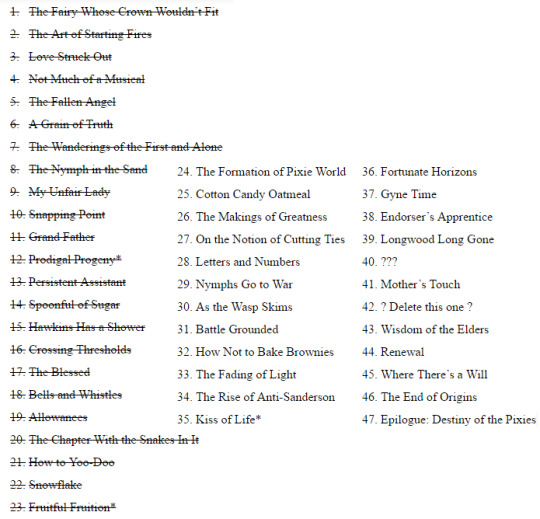
As you can see, I’ve now finished with Acts 1 and 2. Origin got so big that it was taking the Google Docs app on my phone a painfully long time to load the story, so the second list is in my second document, and the third in the third. The asterisks symbolize the four different Acts-
Act 1: The transition from H.P. living on his own to officially accepting Sanderson
Act 2: H.P. struggling with questions, lifestyle choices, and little kids; being abducted by the cherubs and studied
Act 3: The development of Pixie World, the war over godchildren, the study of the Wolbachia bacteria, and the aftermath of the war
Act 4: Tying up loose ends; H.P. dealing with his pixies growing up and aging himself
This table of contents is pretty important to me, since I tend to write scenes as I think of them and jump up and down the story. This list helps me keep my facts straight (although tbh I can keep 99.99% of the order, mood, and timeframe of scenes straight in my head because that’s just the way I am. I can accurately keep track of hundreds of characters without double-checking their info constantly. Can I recognize somebody new in my life that I was introduced to the day before? No).
I have the kind of personality that enjoys completing things for the sake of completing them, so scratching them off is very reinforcing to me. Look how much I’ve done! Origin of the Pixies is easily the longest FOP fanfic on the Internet, and only halfway done! I did this! Isn’t that awesome? I wanna finish this puppy! I’ve poured so much of my love and time into it!
Here’s a snippet of the table from my Total Drama fanfic, The Lyin’ Queen:

The chapters are all named after Simple Plan songs as a reference to Staci listing her favorite band as Simple Flan. In this table, you can see I have small notes next to each chapter. That can be helpful too! Origin actually had notes like this back before I memorized what happens in which chapter.
Now, remember that I noted down everything I could think of. To create the table of contents, I calculated in my head where in the story I wanted things to fall (hence the notes in parentheses), and where I envisioned chapter breaks. In Knots, for example, my chapters are divided like this:

I picked this part of Knots rather than Origin because you can see that “Grand Day Out” has nothing in it yet (whereas all my Origin chapters have more content). However, I know that it exists. I went ahead and wrote it there so I wouldn’t forget; when I’m in the mood to write the ceremonial send-off scene or anything else about the upper planes of the Deep Kingdom, then I’ll scroll down to this section of the document and add it in. “Pretty Boys”, though, already has quite a few scenes written already!
Fun Fact: The Faelumen were originally designed to exist in Knots alone, and weren’t mentioned at all in Origin. It was supposed to be a big, fun surprise reveal… but after I wrote some scenes with Dame Head, I loved her too much. Plus, I thought it was something I should talk about with the whole “pixies reproduce asexually thing”, and answer the questions about why she wasn’t in Origin when Anti-Fergus was. Then the religion thing happened… Yep!
If you’ve been keeping up with this blog and Origin, you know that I unexpectedly split “Fruitful Fruition” in half to create “Snowflake”, even though the latter wasn’t in my outline. That’s okay! This is why I like to write as I go along rather than planning out too many details. It’s easy to be flexible!
TIP: Generally speaking, I write rough draft scenes as I think them up. They stay that way as rough drafts; I don’t worry about them too much. They’re full of underscores, and even in some cases, blatant mistakes.
Originally, Anti-Cosmo and Anti-Wanda had their first kiss upside down in a tree. The draft scene is written that way. Now it’s in a petting zoo, because really, why would you not?
Point being, there are still several references later in the story about them being in a tree that I haven’t yet corrected. I’ll do that when I actually write the chapter from start to finish and decide what to cut.
When I really sit down to write the story, though, I go in order. From the start of the chapter, with maybe a few pops forward when something comes to mind, but mostly, I go in order.
Otherwise, you might have a great scene, but it doesn’t fit the flow or mood of the story, or - worse - something came up and now the scene doesn’t make sense at all, after you put in so much effort.
If I’m in the mood to write a scene, I make time to pen the draft down as soon as possible. I do NOT say, “I’ll just hang onto that thought and write it all when I get there”. Use it or lose it!
At this time, Knots has all the scenes loosely written that I first thought of (bringing the document to approximately 200 pages). These are main scenes: conflicts with Mom, coming-of-age ceremony, Wish Fixers therapy, lots of Anti-Wanda stuff, basically all the Anti-Sanderson stuff, scenes from the war…
The next goal is finishing my outline and how I want to pace things / jump around, then figuring out the drafts for main scenes I haven’t finished yet (the opening scene, A.C.’s wedding, Anti-Bryndin, more war stuff, the bake-off, etc.) Once those main roughs are done, I’ll start writing the final version of Chapter 1, and eventually post it! Then I’ll begin work on the final version of Chapter 2, with occasional pauses to add more draft scenes later in the story if I think one up.
.:: MOTIVATION ::.
Aside from scratching off chapters being reinforcing, talking about my work on this blog helps a lot too. Although no chapters have been posted, I can’t very well back out of Frayed Knots; you know too much and I won’t make a liar out of myself now. It might take me weeks or months, but I’ll get to it!
NOTE: Revealing TOO MUCH can be severely detrimental! You may trigger your brain’s response that, “Oh, I talked about this thing? I shared it, my task is complete, I can be satisfied and stop now”. You may notice I try to only share stuff from Knots that I’ve already written, and keep my lip buttoned on stuff that’s still up in the air.
For some people, something as simple as crossing a chapter off their list may not be satisfying enough. You could always reward yourself with a bit of ice cream or candy or another treat, say, if you finish a chapter, or if you wrote a certain amount of words each day. I usually reward myself with more writing.
The NaNoWriMo community has been very supportive to me in the three years I’ve participated in National Novel Writing Month (the goal being to write 50,000 words between November 1st and November 30th).
On that site, when you make an account and sign up for the event each November, you get a purple bar underneath your username. It announces how many words you’ve written so far. If you write just 1,667 words a day, you’ll reach 50,000 by the 30th this post is almost six times that oh my gosh.
Again, being able to update my wordcount and see how well I was keeping on track was very rewarding to me, and I’ve met the 50k count for 3/3 NaNovels (Courtesy, Silverfish, and Protagonist For Hire, which amazingly somehow got its 50,000 but is very poorly written and not close to done)!
You can also win promotional codes and stuff. I got five free self-published copies of my 2012 novel Courtesy of Number 124 when I finished and formatted them, among other benefits! It depends on the year, I think!

Again, I like completing things. I like HAVING things. After many hours of searching the web, I was disappointed in the lack of Pixie ‘fics. Although there were some, it wasn’t enough for me. I didn’t want Pixies putting another 37-year-plan into action, or getting revenge on Timmy. I wanted serious backstory.
As previously mentioned, by establishing that H.P. had written Origin, I was at a risk for writing Sanderson as dumb for not knowing something H.P. had mentioned in his book. Sanderson has read and studied Origin extensively, so I had to make sure he didn’t “conveniently” forget a fact he should know, and when writing Origin, I have to make sure not to contradict Sanderson, or give the answers to anything he stated in Rich Man that he doesn’t know
Fact: In the Origin Act 2 finale, I used “breathed” as a said tag for the first time in this story. One of the underlying things in Rich Man was, Sanderson didn’t fully grasp the concepts of how humans breathe. The word “breathe” doesn’t come up much in Rich Man, until the closing lines, like “He never stopped breathing”. I have been IN PAIN not using “breathed”, so I finally bit the bullet because forget this.
And of course, as a result, that means H.P. shouldn’t have taught him anything about humans breathing. This I… slightly retconned, because breathing turned out to be more important for Origin than I had previously expected.
Though, in Rich Man, Sanderson never explicitly says he doesn’t know what breathing is (Obviously he has to know, considering he finally said the word). It’s just, I was subtly trying to hint in Rich Man that he truly recognized the nature of his own self - a being who could technically be called half mortal, half immortal - at the same time he began to understand Flappy’s human nature.
ANYWAY, figure out how you’re motivated and then play to your own wants and needs! Passion and a love of the work is arguably the best way to be, because it’s simple. But if praise is reinforcing to you? Share what you’ve done with me, and I’ll give you many pats on the back!
That… would have been the only three sentences required to answer this Ask, but I wrote this giant post instead. YOU KNOW WHO I AM, DENISE!
.:: OTHER WRITING ADVICE B/C IDK WHY NOT? ::.
You’re writing for two audiences
The first is of course your readers. That’s the easy answer. But, you ought to love what you’re doing. The second audience you write for is yourself. What have you always wanted to write, but haven’t gotten around to?
For me, I love extravagant coming of age ceremonies! I’ll take any excuse to dress characters up in something they wouldn’t normally wear, force them to participate in things they otherwise wouldn’t, or shove them in a situation where they’re horribly embarrassed but can’t escape.
And, I love inventing fantasy religions! Religious beliefs can be huge motivators for characters that can explain being “out of character”. Take advantage of this!
For a third example, Origin of the Pixies gave me the chance to write about marsupial pouches and the embarrassment of one’s offspring crawling into said pouch while in public. That’s been a joy from start to finish.
Write the scenes you “can’t afford” to write
Well, uh… so, here’s a little secret I was never planning to share… I’ve written make-out scenes and yes, even some more intimate scenes while working on Origin and Knots. They’ll just never appear, and you’ll never get to read them. It’s not something I EVER would have done just a year ago, and yet here I am.
I am a sex-repulsed aromantic asexual. I have no business nosing my way into this area. And yet I did. And it was very interesting.
I was mostly curious to see how well my skills held up trying to describe scenarios I know little about, and it turns out that mostly, they held up extremely well! I think. It’s kind of refreshing to just let yourself write and know that no one will ever judge you on it.
Obviously, don’t write something that makes you uncomfortable just because I said here that it’s something that helps me in my writing.
Really, I didn’t focus so much on writing intimate scenes per se so much as the situations that led up to them (BOY, let me tell you how many of these “sex” scenes I have with a bunch of flirtation and set-up, and then they just… go blank, because I already had all I needed to know about how the characters would act when being romantic in private). Situations are really interesting. Emotions, dialogue, lack of one or both… Different people act in different ways.
I have H.P.’s kissing scene under the stairs with a random girl, squished between four other couples, from the party in Chapter 4- That one was REALLY fun, and recently I ended up recycling most of that scene as a sort-of flashback early in Origin Act 3 (loosely down as falling in “Cotton Candy Oatmeal”). Very teenager-y and full of hormones, which was the point. Seriously, that scene came out SO DANG WELL, and I’m very proud of my aro/ace un-kissed self. Oh man, I’ve written so many nice behind-the-scenes scenes full of character fleshing that I wish I could share.
I have Ambrosine and Ilisa Maddington (Ambrosine admiring her shampoo and giant white bathtub is adorable to me, for some reason). For crying out loud, I even wrote “‘Stars and Finches’ AU where most everything’s the same in this scene but Gavin and Ethel try to be flirty b/c I need to know how they act for research” Answer: They are super, super clueless and awkward and in this AU they DEVASTATE their relationship this way it’s so hilarious to me because “Let’s shatter these two emotionally” generally isn’t what you’d expect to get out of “AU where this story has romance / making out and jazz in it”.
Idk this is just really fascinating to me? I can still keep them 100% in character even in situations they wouldn’t normally find themselves in? I’ve explored their personalities just to understand them better, not to impress readers? I love it!
SO! The reason I wrote these things is simple: Character fleshing. You’re the author! Characters’ personal lives are completely your business. It might help to know how these people act when the audience isn’t supposed to be watching- and then draw inspiration from that to use in the actual story.
Case in point: One thing that absolutely shocked me was the way cute and sweet China acts behind closed doors. Freaking China. Apparently she’s really nice and casual by day, but she’s super specific at night, and will pitch a fit if things don’t go her way. She guilts the heck out of H.P. It’s her little way of getting control, being a selkie…
Basically, she did a 180-flip in my mind after I wrote the dialogue exchange and narrative reflecting on their relationship, and I loved it. Almost all of the lines from those few paragraphs ended up in Origin.
And given how many relationships H.P. makes and breaks over the 700,000 years this story covers, going behind the scenes this way allows me to compare and contrast his girls. Whereas China is specific and decides when they sleep together, Kalysta is easy-going just as long as he’s there. Very, very interesting and very fun for me!
Of course, don’t do anything you’re uncomfortable doing. But maybe break out of your comfort zone and write scenes that will never make it into the story. Not just kissy-kissy scenes, but other scenes too:
Those shady deals behind the best friend’s back
The moment the villain realizes someone’s out to stop her
Midnight snacks
Doctor and dentist appointments
Birthday celebrations
What happens when they’re out of their favorite breakfast
Being stuck in traffic / going to work
Relatives coming to visit
Grocery shopping
A situation where they are the only one stressed
Trying a new recipe
Cleaning the house
Ordering at a fancy restaurant
Ordering from a drive-thru
First cruise vacation
Service for a friend or stranger
Multitasking (TV, phone conversation, and food?)
Big homework assignments
Interview / performance review
Visiting a museum
Going to the pool / waterpark on a hot day
Visiting a sick friend or relative
Attending a funeral (for someone they either know well, or don’t)
Take your kid to work day
Caught in the act of an embarrassing habit
Accidentally set something on fire
Can’t find an item (either dumb or important)
What happens during timeskips
Before the story begins
After it comes to a close
Stuff that happens in daily life, but the reader doesn’t need to know because it doesn’t add enough to the story. Or, maybe some of these will turn out to be crucial, and you can work them in. Writing about what your character sees in a museum is a great way to worldbuild, and then you can sneak hints of what you learn from writing that prompt into the actual finished work. Hint at a world that keeps getting deeper. Treat yo’self- you might just be surprised.
… I realize that we’re straying from the original topic, but I’m on a roll here. Hmm. I’ll make a separate prompt list for all of these things and post it later.
Google Docs is a good way to go
Google Docs is free to use, the only stipulation being that you need a gmail account, I think. If you have an iPhone or something, download the Google Docs app. It’s free too.
Whatever you write on one will sync to other devices automatically. Take advantage of this and, if you’re not socializing or keeping an eye on your surroundings otherwise, write everywhere. Write when you’re a passenger on the bus, write between class changes, write while you’re eating with the other hand, and if you have enough self-control to still get to sleep on time, you can keep it beside your bed.
I’ve only had Docs crash on me once in two+ years, and since it saves automatically as you work anyway (and saves your past edits), I didn’t lose anything. I used WordPerfect for almost a decade, I’ve often used Microsoft Word for school papers, and I have Scrivener, but Google Docs is my favorite to write with because I can walk up to any computer, log in, and access my 85+ files in an instant. Dropbox syncing used to take HOURS back in the day.
(The one thing I might mention is that if I remember correctly, the Google Docs app is extremely hard to log out of on the iPhone, if there is even an option. It’s been some time since I checked, however, but may be something to keep in mind for those who share phones with people they’d be embarrassed to have reading their work.)
Take your time
Seriously, timing is everything. I could name numerous pieces that would have been vastly different had I submitted them as soon as I thought they were ready. It was seven months after I “finished” “Bells and Whistles” before I was able to post it, and it changed a surprising amount after all those revisions!
It’s okay not to have your worldbuilding fully worked out when you start. In fact, I’d even say it’s better that way! When you worldbuild as you go, you’re truly immersed in the world and the work!
And lastly?
Find the good in everything, and accept the bad along with it. You gotta, bro.
Don’t compare yourself to other writers. You’re all working to entertain and have fun. It’s not a competition- you’re just here to be better than yesterday. Look to other writers to study and admire and learn from, but don’t let their years of hard work make you feel less about your years of hard work.
Hope I helped ya, and thanks for asking for my advice! Keep me posted on how your work goes!
#How to write more good#ridwriting#FAIRIES!#Rich baby story#Origin of the Pixies#Frayed Knots#I'm wasp dad trash#The bat with the hat#Sanderson is neat#The Worth of Ink#Courtesy of Number 124#99% true as far as we remember#screenshots#Dog's Day Afternoon#GIFs#Body and the Beast#Thunder and Frightening#Beasty such a beaut#No Anesthetic#Going Ghost!#Goldfeather works
12 notes
·
View notes
Text
OC History
Ah yes, history. Everyone has a past. Even an amnesiac person had a life up until whatever caused them to lose their memories. The events that a person experiences shapes a lot of who they end up being. How did you character get to where they are now?
Childhood: Relative Pitfalls
One of the first things you need to decide is who your character’s parents are. They are the ones that have brought your character into the world and raised them. Their looks will influence your character’s general appearance. Think long and hard about their looks and how they will act.
Are your character’s parents canon characters by chance? That can happen. Just make sure that it’s plausible that they have gotten together and want a child. Try to not have them too young at the time. Teenage pregnancy is a lot more difficult than it looks on TV.
One of the best things you can do is show your characters interacting with their parents. It establishes their family bonds, adds a fluffy moment or two, and helps avoid certain cliches that are too common. Those cliches are distant parents, abusive parents, vanished parents, and dead parents.
A lot of authors don’t like going through the trouble of making parents for their characters. A lot of characters have parents away on frequent business trips, parents that are emotionally absent and go elsewhere, mothers that died during their birth, fathers that never knew about their children, and parents that hurt their kids with words, force, and who knows what else. This trend needs to stop.
Whenever I am on Fanfiction.net, I notice that a lot of the summaries for stories include the fact that the main character is abused, is being pushed away in favor of their siblings, or is an orphan. These story ideas should not be so common.
Most parents love their children. They brought their children into the world because they wanted them. Cases of a parent resenting their unborn child are rare. Most parents do not die until their kids have reached adulthood, although this can heavily depend on the setting’s medical knowledge and technological level.
They are already enough canon abused characters from the books I read. Harry Potter, Cinderella, Crookedstar of RiverClan from the Warriors series, and Breezepelt of WIndClan from the Warriors series. What do they all have in common? They were all abused in some way by at least one of their guardians. They all responded in different ways. Try a different conflict.
Having a character’s relatives die can be realistic if you choose the right fandom. Neither the Warriors series or Naruto have safe settings. Several characters in both die in the backstory from the harsh conditions. Several characters in Harry Potter lost relatives from the first and second wizarding wars. Just be careful not to exterminate all of your characters relatives. Setting them up for a Sasuke Uchiha avenger-type deal is just not a good idea.
Childhood: School and Friends
All young kids have to attend school or some equivalent. School is where kids learn basic skills such as reading, writing, math, history, typing, geography, science, the arts, music, foreign languages, and whatever is important to their society. At the least, children should be home-schooled by their parents so they know basic skills or be apprenticed to someone to learn a trade.
Where did your character attend school? What was their favorite subject? Who was their favorite teacher? What type of kids did they hang out with there? When did they graduate?
Friends are non-negotiable. Just about everyone has a group of friends. Even if they are part of a discriminated group, they will likely have one or two friends at the least. Friends offer your character social interaction, different viewpoints, and an influence other than family members. The only reasons that a child would not have friends are if their parents kept them isolated or heavily sheltered (or if they lived in a remote area with no other kids).
Think of where your character liked to hang out and what they liked doing as children. Do their hobbies and childhood hangouts sound plausible for their age and their series’ setting? Did they like to fish, hunt, or climb trees? Did they often order food from a fast food place? Were they a fan of sports? Were they addicted to television and video games? Jot everything down.
Did your character have a pet of some kind while a child? If so, what type of creature was the pet? How close were they? How well did your character take care of the pet? What fun things did they do together? Did the character have to give away the pet or otherwise take the pet on that final trip to the vet at some point?
There are exceptions for schooling, of course. Being educated was not so common back in ancient times. Schooling was once a privilege. But, your character should at least be taught how to make some money, survive, and behave in society.
If your character has a high-ranking job that requires some college education, think of some of the groundwork they laid as a teenager to make their path possible. How hard did your character study? How well did they perform on tests? Did they apply for loans or pick up a part-time job?
Childhood: Plausible Losses
Your character’s life should not be a tragedy, but there will be times where they are forced to say goodbye to people they know and love. Friends will move away for whatever reason. Maybe an aunt or uncle gets in trouble and has to go to prison.
Parents will sometimes not be able to get along and divorce, which can open a large can of worms. Pets usually do not live as long as their owners. People will occasionally be victims of fatal accidents or terminal illnesses. As long as your character does not suffer losses left and right without reason, there is not a problem.
Think about the character’s reaction to the loss. This may depend on whether the loss was gradual or something they knew about sometime in advance. Another factor is the closeness to characters involved in the loss. They may cry or fume in anger. They will probably wonder why this is happening. They may feel isolated. Write your character’s feelings about it into their story so the audience can sympathize. Take care to make their reaction stay in proportion to their loss.
Characters that have suffered a loss need time to recover. They may still have emotional outbursts about the event even months later if something triggers it. There are some events like the divorce of their parents or the deaths of their sibling or best friend that they may never fully recover from.
Harry Potter’s George Weasley never apparently recovered from his twin brother Fred Weasley’s death. The character should learn to live with the loss while not fully getting over it if this happens. Not many people remain in crippling depression over a person’s death forever.
Childhood: Other Tragic Events
Losing loved ones is not the only bad thing that can happen to characters. Depending on the setting, they could be beaten senseless for a reason they do not understand, abused, kidnapped, enslaved, abandoned, or raped. Their family could go bankrupt.
Shy away from these kinds of events when possible. It is a difficult task to write these kinds of situations correctly. The Warriors series recently failed at this when they depicted a pedophilic relationship in Spottedleaf’s Heart. Abuse victims that were Warriors fans got triggered as they had no idea of what the story contained until they read it. If you utilize abuse or rape at all in your story, put a warning either in the summary or the beginning of the chapter where it takes place.
Most fanfiction readers don’t like it when the main OC character’s dark past overshadows the story. Try to only bring up negative parts of your character’s past when it becomes relevant. Attempt to give your character a normal happy childhood.
If you decide to use such events anyway, research as much as you can about what dark subject you’re using. Portray it as realistically as possible. As a rule of thumb, most people do not dwell on a traumatizing event from years ago unless something recent has triggered their memories of the event.
Childhood: Significant Events
Some events will impact your character’s views even if the event seemed minor at the time. Let’s say a boy sees chickens in a dirty cramped pen somewhere. He may decide that he hates what he is seeing, and grows up to lobby for better living conditions for farm animals. Maybe he swears off meat all together.
Maybe your character hit a milestone and reached a goal. Perhaps a young ninja from a clan has mastered their clan’s signature jutsu. Note anything big that happens to your character. Think of their response and that of their family.
Remember that a character’s views do not pop out of nowhere. Make sure that a certain event and character’s response to it matches with their values.
Adolescence: Love
Romance is a nightmare for many writers. It can overshadow a story’s main plot. But, like it or not, adolescence is when a person discovers their interest in romance for the first time. Many changes are occurring in their body. Boys no longer think that girls have cooties. Girls are seeing that guys look attractive. Their hormone-driven thought may impair their judgement.
A few ways to hint puberty is affecting your character without it messing up the rest of the story is to mention the character either thinking about or discreetly checking out people their believe are attractive a few times. It does not need to be a full-blown crush or reciprocated by the other person.
If you do go the romance route, do not cheat. Show how the two involved characters got introduced to each other. Describe how their different personalities click. Put emphasis on the relationship slowly building up.
Do not have them perform sex with each other until they have grown close enough for that. Keep in mind minimum age legalities for sex as well if you use it during your story. I suggest no younger than sixteen for either party unless your story takes place in a historical setting where the age limit on sex and marriage was lower.
Does your character and any partners they have get into arguments? How are they resolved? Are the arguments so severe that they break up?
On another note, it is perfectly okay for your character to be uninterested in sex or romance. Not everyone is interested in that. Just make your character’s stance clear if you take that route.
In Conclusion
Make sure your character’s past is sensible for their current situation. No one likes an inconsistent or implausible backstory. Have fun!
0 notes
Text
Problem Sleuth— more than just Homestuck lite

It blows me away how few people have read Problem Sleuth.
Homestuck may be waning in popularity, but even among its fans few have read any of Hussie’s previous work. Which is fair, since most of it doesn’t have nearly as broad an appeal as Homestuck. Put bluntly, Jailbreak and Bard Quest read more like prototypes—more significant in their relation to Homestuck rather than standing on their own. I can see why people might start with Jailbreak, become frustrated and give up long before making it to Problem Sleuth. So, why does PS stand out from its predecessors and more successful sister? Sit down n get ready to hear about a really underappreciated webcomic!
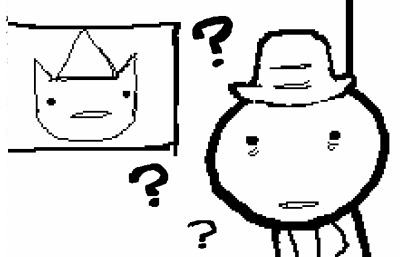
What is it?
Let’s start with a quick overview. Problem Sleuth is the comic Andrew Hussie made before Homestuck. The comic starts with the titular Problem Sleuth finding himself trapped in his own office. He is soon united with two other detectives, Pickle Inspector and Ace Dick, and the three of them set off on what at first seems to be a typical escape the room narrative. Almost like Jailbreak, but with a fresh coat of Film Noir paint. However, it isn’t long before those genre trappings give way to something much more surreal. Armed with one-liners and the power of imagination, (yes really) The detectives must defeat the diabolic/diabetic Mobster Kingpin to escape the white walls of their offices.
So, why read it?
Well, for starters-- Problem Sleuth is a FINISHED WEBCOMIC.
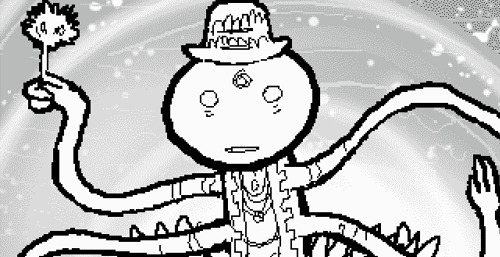
You may find it odd that I’m starting off by talking about the ending, but this really does count for something. It’s a shame, but the webcomic experience is mostly spent waiting for the drip feed of updates, with a solid conclusion lying years down the road. For puzzle plots, this can make keeping up a chore, since it’s easy to forget about the minute details as the months go by. Part of the reason why Homestuck did so well is that those drips and draps of content came at such a rapid pace, keeping details fresh in readers’ minds. However, this pace also resulted in a massive, intimidating tome measuring over 8,000 pages. PS, by comparison, weighs in at a scant 1,600.
In and of itself, being short isn’t necessarily good. But in this case, it works heavily in PS’s favor. The entire thing makes for a great afternoon read, and you don’t have to study up on it for weeks to understand the story’s inner workings. Don’t get me wrong, Problem Sleuth still has a jigsaw plot that will make your head spin. However, it’s a jigsaw plot that a casual reader can parse through and fully understand without resorting to a wiki guide.
I’d argue that all of Homestuck’s puzzle elements can be found in PS, but in a more condensed and concentrated form. Instead of splitting the difference between plot and character interaction, PS chooses to specialize. Over the course of the story, one-off gags resurface as important devices, multiple versions of characters start running around, and video gamey puzzle bullshit abounds. The twists and turns are always the main event, and boy do they deliver.
A re-read isn’t nearly as daunting either, making it very enjoyable to revisit the comic again to catch all the little tidbits you might’ve missed the first time. This brings me back to the ending-- the conclusion wraps up every plot thread, no matter how dangly and dissonant. With PS, every question has an answer. (Although, you know what they say about stupid questions. That’s another thing that makes it good though)

However, just because PS focuses more heavily on plot doesn’t mean it slouches in the character department. It may lack Homestuck’s colorful, lengthy pesterlogs, but what it lacks in dialogue it more than makes up for with sheer charm. Readers still view the world through snarky second person monologue, and these bits are all peppered with snark and personality from the cast. No words are directly spoken, but the narration combined with the goofy, crude visuals paint an incredibly charming picture of the characters. (this is a great example of how to do Show, Don’t Tell right!)
There’s not much more I can say without getting into spoilers, but I can’t emphasize PS’s strengths enough. Whether you’re a Homestuck fan or not, this comic stands on its own as a testament to the potential of the medium. Give it a go, don’t take things too seriously, and get ready for some hardboiled antics!

And, if after you finish you want more like it, I have 2 recommendations for you.
The first is Homestuck’s act 3 intermission. Yep, just skip right into it. The whole thing is self-contained and is about as close to Problem Sleuth as it gets short of the real thing. I’d particularly recommend Let’s Read Homestuck’s narrated version on youtube-- those mobster accents really nail the noir-y crime vibe.
The second is a bit different-- Gigi D.G.’s Lady of the Shard. This short comic may not share Problem Sleuth’s surreal humor or intricate puzzle plot, but it’s presented in a unique format and holds a very satisfying conclusion. Highly recommended to fans of webcomics in general!
0 notes